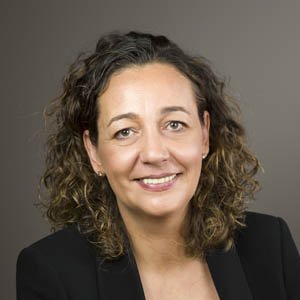Master´s Degree in Management and Digital Transformation of Educational Centers

Lead digital change in your center by driving digital innovation and its development
The Master's Degree in Management and Digital Transformation of Educational Centers, supposes an academic specialization in relation to the transformation of educational centers, and using technologies as the backbone.
It is not just about integrating technology into the classroom. When we talk about digital transformation in the educational field, we are referring to a more radical change in institutions, which affects all aspects and processes of an educational organization: educational processes, of course, but also structural, organizational, management, planning, etc.
This degree provides a global understanding of the digital phenomenon at an institutional level, taking into account all its dimensions: technological, informational, organizational, personal, educational. Hence, the master's includes technical subjects, but also innovation management, organizational culture, people management and leadership.
Read +In this degree, the importance of the role of the management of educational centers is taken into account, since the entire process of digital transformation depends on them. For this reason, it intends to train directors of educational centers capable of transforming their school into a highly digitized institution. They will be in charge of leading the change so that the educational experience is more complete, adapted and personalized to the student.
Graduates of this Master's will be able to promote the technological updating and training of teachers, renew the management and communication processes of the center and learn about the digital tools available and their adaptation to the educational institution. In addition, they will be in charge of leading this transformation and instilling a digital adaptation mentality throughout the center.
Read lessLet’s Talk About Education
First chapter of the video podcast specialized in Education where the research processes and their application in neuroscience and the educational sector are analyzed.
Student profile: Those interested in studying and obtaining the Master's Degree in Digital Management and Transformation of Educational Centers from Nebrija University must comply with the requirements imposed by current legislation, the admission profile being that of a university graduate or equivalent (graduates) in Teaching, Pedagogy, Psychology or Psychological Teaching. Also, given the multidisciplinary nature of the program, students who have completed the Master's Degree in Teacher Training for Compulsory Secondary Education and Baccalaureate, VT and Language Teaching or the Teaching Aptitude Certificate (CAP).
Official Degree:Master´s Degree in Management and Digital Transformation of Educational Centers
Center responsible:School of Language and Education
Branch of knowledge: Social and Legal Sciences
Places offered: 300
Total Credits:60 credits.
. Minimum 12 ECTS credits and maximum 60 ECTS credits per enrollment and academic period
Academic year it was implemented: 2019/2020
Duration: 1 year, from October to June
Academic Regulations: General student’s regulations. Credit transfer and recognition. Regulation of student participation. Common procedures for carrying out the Final Research Project
University Services: [+info]
Internal Quality Assurance System System managers Incidents, Suggestions and Complaints Job placement report and assessment of training received
A future-oriented program with an innovative and cutting-edge curriculum
Curriculum
All our degrees and curricula have been prepared in accordance with the new guidelines set by current legislation, having already been verified by the National Agency for Quality Assessment.
The student must take 60 credits
First Semester 30 ECTS
From October to January, both included- 4 ECTS | Modernization and Knowledge Society
- 4 ECTS | Educational Transformation in Centers
- 6 ECTS | Educational Leadership in the Digital Context
- 4 ECTS | Methodologies for Change
- 4 ECTS | Teacher training and New Digital Profiles
- 4 ECTS | Evaluation and Quality in Educational Centers
- 4 ECTS | Project Management and Technology Planning
Second Semester 30 ECTS
From January to June, both included- 6 ECTS | Collaborative Platforms and Content Digitalization Tools
- 6 ECTS | Learning Analytics
- 6 ECTS | Social Networks and Digital Communication
- 6 ECTS | Interships
- 6 ECTS | Final Research Project
Information if these subjects
Professors
| Profesores Professors | Porcentaje de Doctores Percentage of PhD holders |
| 57 | 84,21% |
 Nuria Camuñas Sánchez-Paulete
Vicedecana de la Facultad de Lenguas y Educación
Vice Dean of the School of Languages and Education
Doctora en Psicología por la UCM. Máster en Intervención en la Ansiedad y el Estrés (UCM). Licenciada con grado en Psicología (UCM). Directora del Área de Educación de la Facultad de la Artes y las Letras. Es profesora de la Facultad de Lenguas y Educación en grado y postgrado. Docente de distintos cursos de formación y máster, sobre ansiedad, emociones y educación, estrés, modificación de conducta y dificultades del aprendizaje. Autora de distintas publicaciones y presentaciones en congresos relacionadas con procesos cognitivos, emoción y educación, prevención y control del estrés, etc. Miembro del grupo de investigación en Formación del Profesorado y Educación (IFPE). Otras líneas de investigación: Cognición, Emoción, Salud y Educación.
Nuria Camuñas Sánchez-Paulete
Vicedecana de la Facultad de Lenguas y Educación
Vice Dean of the School of Languages and Education
Doctora en Psicología por la UCM. Máster en Intervención en la Ansiedad y el Estrés (UCM). Licenciada con grado en Psicología (UCM). Directora del Área de Educación de la Facultad de la Artes y las Letras. Es profesora de la Facultad de Lenguas y Educación en grado y postgrado. Docente de distintos cursos de formación y máster, sobre ansiedad, emociones y educación, estrés, modificación de conducta y dificultades del aprendizaje. Autora de distintas publicaciones y presentaciones en congresos relacionadas con procesos cognitivos, emoción y educación, prevención y control del estrés, etc. Miembro del grupo de investigación en Formación del Profesorado y Educación (IFPE). Otras líneas de investigación: Cognición, Emoción, Salud y Educación.
ncamunas@nebrija.es
 Patricia González Collado
Directora del Máster Universitario en Dirección y Transformación Digital de Centros Educativos
Director of the Master's Degree in Digital Management and Transformation of Educational Centers
Doctora en Educación por la Universidad Autónoma de Madrid con mención Cum Laude. Graduada en Pedagogía por la Universidad de Oviedo y Máster en Calidad y mejora de la Educación por la Universidad Autónoma de Madrid. Cuenta con una amplia experiencia en el ámbito de la formación a distancia, tutorizando proyectos e-learning y gestionando plataformas virtuales aplicadas al proceso de enseñanza-aprendizaje. Una de sus líneas de investigación está centrada en la Pedagogía de la Muerte en el contexto educativo y hospitalario. Es investigadora en proyectos I+D+I como “Innovación e Inclusión de la Muerte en Educación” y “Pedagogía Pandemia y Mejora de la Educación” (Ministerio de Ciencia e Innovación). Co-autora de los libros “La práctica de la pedagogía de la muerte: Guía Educativa y Plan Lector”. Ha presentado diversas comunicaciones y ponencias en Congresos Educativos. Actualmente, es directora del Máster en Dirección y Transformación Digital de Centros Educativos y del Máster en Gobernanza Educativa en la Universidad Antonio de Nebrija. También es docente en el Máster Universitario en Formación del Profesorado de ESO y Bachillerato, FP y Enseñanza de Idiomas (Universidad Antonio de Nebrija).
Patricia González Collado
Directora del Máster Universitario en Dirección y Transformación Digital de Centros Educativos
Director of the Master's Degree in Digital Management and Transformation of Educational Centers
Doctora en Educación por la Universidad Autónoma de Madrid con mención Cum Laude. Graduada en Pedagogía por la Universidad de Oviedo y Máster en Calidad y mejora de la Educación por la Universidad Autónoma de Madrid. Cuenta con una amplia experiencia en el ámbito de la formación a distancia, tutorizando proyectos e-learning y gestionando plataformas virtuales aplicadas al proceso de enseñanza-aprendizaje. Una de sus líneas de investigación está centrada en la Pedagogía de la Muerte en el contexto educativo y hospitalario. Es investigadora en proyectos I+D+I como “Innovación e Inclusión de la Muerte en Educación” y “Pedagogía Pandemia y Mejora de la Educación” (Ministerio de Ciencia e Innovación). Co-autora de los libros “La práctica de la pedagogía de la muerte: Guía Educativa y Plan Lector”. Ha presentado diversas comunicaciones y ponencias en Congresos Educativos. Actualmente, es directora del Máster en Dirección y Transformación Digital de Centros Educativos y del Máster en Gobernanza Educativa en la Universidad Antonio de Nebrija. También es docente en el Máster Universitario en Formación del Profesorado de ESO y Bachillerato, FP y Enseñanza de Idiomas (Universidad Antonio de Nebrija).
pgonzalezco@nebrija.es
 Camino Ruiz Rodríguez
Coordinadora del Máster Universitario en Dirección y Transformación Digital de Centros Educativos
Coordinator of the Master's Degree in Digital Management and Transformation of Educational Centers
Titulada en Psicopedagogía por la Universidad de Valladolid, con Magisterio en Educación Especial y Magisterio en Educación Primaria por la Universidad de Burgos. Especializada en Gestión de Recursos Humanos y Gestión Empresarial por la Universidad de Alcalá de Henares y como profesora de religión católica por el instituto superior de ciencias religiosas "San Jerónimo" vinculado a la facultad de Teología del Norte de España. Profesora universitaria en el Grado de Educación Infantil, Grado de Educación Primaria, Máster en Psicopedagogía, Máster en Dirección y Gestión para la Calidad de Centros Educativos, Máster en Enseñanza del Español para Extranjeros y Máster en Educación Secundaria, en distintas universidades de ámbito nacional. Es directora de TFM y TFG y participa como miembro de tribunal de evaluación de proyectos de investigación fin de Máster y fin de Grado.
Camino Ruiz Rodríguez
Coordinadora del Máster Universitario en Dirección y Transformación Digital de Centros Educativos
Coordinator of the Master's Degree in Digital Management and Transformation of Educational Centers
Titulada en Psicopedagogía por la Universidad de Valladolid, con Magisterio en Educación Especial y Magisterio en Educación Primaria por la Universidad de Burgos. Especializada en Gestión de Recursos Humanos y Gestión Empresarial por la Universidad de Alcalá de Henares y como profesora de religión católica por el instituto superior de ciencias religiosas "San Jerónimo" vinculado a la facultad de Teología del Norte de España. Profesora universitaria en el Grado de Educación Infantil, Grado de Educación Primaria, Máster en Psicopedagogía, Máster en Dirección y Gestión para la Calidad de Centros Educativos, Máster en Enseñanza del Español para Extranjeros y Máster en Educación Secundaria, en distintas universidades de ámbito nacional. Es directora de TFM y TFG y participa como miembro de tribunal de evaluación de proyectos de investigación fin de Máster y fin de Grado.
cruizro@nebrija.es
 Clara Díaz-Cordovés Verbo
Coordinadora de alumnos del del Máster Universitario en Dirección y Transformación Digital de Centros Educativos
Coordinator of students of the University Master's Degree in Management and Digital Transformation of Educational Centers
Titulada en Grado de maestro en educación primaria con la especialidad de Lengua, Lectura y Multiculturalidad, interesada en factores que afectan de forma directa en el alumnado, realiza cursos de ampliación profesional relacionados con acoso escolar, prevención del acoso escolar. Interesada de forma especial en TDAH, realiza trabajos voluntarios para con éste grupo. Titulada en Psicomotricidad Infantil y con especial interés en la atención al alumnado con discapacidad sensorial. Titulada en Grado Superior de Lengua de Signos-Guía Intérprete. Máster Universitario en Enseñanza del español para Extranjeros, con experiencia docente en la materia en centro especialista de Enseñanza del Español en Irlanda. Con intereses artísticos, violonchelista con experiencia de 18 años y pianista desde hace 14. Profesora de prácticas del Máster Universitario en Enseñanza de Español para Extranjeros. Universidad Francisco de Vitoria y gestora de prácticas. Profesora de prácticas del Máster Universitario en Competencias Docentes Avanzadas Universidad Camilo José Cela. Profesora de prácticas del Grado de Primaria con la Universidad Antonio de Nebrija. Personal especialista en orientación en centro de Formación Docente.
Clara Díaz-Cordovés Verbo
Coordinadora de alumnos del del Máster Universitario en Dirección y Transformación Digital de Centros Educativos
Coordinator of students of the University Master's Degree in Management and Digital Transformation of Educational Centers
Titulada en Grado de maestro en educación primaria con la especialidad de Lengua, Lectura y Multiculturalidad, interesada en factores que afectan de forma directa en el alumnado, realiza cursos de ampliación profesional relacionados con acoso escolar, prevención del acoso escolar. Interesada de forma especial en TDAH, realiza trabajos voluntarios para con éste grupo. Titulada en Psicomotricidad Infantil y con especial interés en la atención al alumnado con discapacidad sensorial. Titulada en Grado Superior de Lengua de Signos-Guía Intérprete. Máster Universitario en Enseñanza del español para Extranjeros, con experiencia docente en la materia en centro especialista de Enseñanza del Español en Irlanda. Con intereses artísticos, violonchelista con experiencia de 18 años y pianista desde hace 14. Profesora de prácticas del Máster Universitario en Enseñanza de Español para Extranjeros. Universidad Francisco de Vitoria y gestora de prácticas. Profesora de prácticas del Máster Universitario en Competencias Docentes Avanzadas Universidad Camilo José Cela. Profesora de prácticas del Grado de Primaria con la Universidad Antonio de Nebrija. Personal especialista en orientación en centro de Formación Docente.
cdiazcordoves@nebrija.es
 Lorena Aguilar Zapata
Coordinadora de alumnos del del Máster Universitario en Dirección y Transformación Digital de Centros Educativos
Coordinator of students of the University Master's Degree in Management and Digital Transformation of Educational Centers
Profesora en el Máster Universitario en Enseñanza bilingüe y Máster en Enseñanza de Español para Extranjeros de la Universidad Francisco de Vitoria. Diplomada en Magisterio de Educación Primaria por la Universidad Complutense de Madrid y Grado en Educación Primaria con Mención en Lengua Extranjera. Imparte docencia en el Máster en Enseñanza Bilingüe, Máster en Educación Secundaria, Máster de Tecnología Aplicada a la práctica docente y Máster en Competencias Avanzadas en universidad a nivel Nacional.
Lorena Aguilar Zapata
Coordinadora de alumnos del del Máster Universitario en Dirección y Transformación Digital de Centros Educativos
Coordinator of students of the University Master's Degree in Management and Digital Transformation of Educational Centers
Profesora en el Máster Universitario en Enseñanza bilingüe y Máster en Enseñanza de Español para Extranjeros de la Universidad Francisco de Vitoria. Diplomada en Magisterio de Educación Primaria por la Universidad Complutense de Madrid y Grado en Educación Primaria con Mención en Lengua Extranjera. Imparte docencia en el Máster en Enseñanza Bilingüe, Máster en Educación Secundaria, Máster de Tecnología Aplicada a la práctica docente y Máster en Competencias Avanzadas en universidad a nivel Nacional.
laguilar@nebrija.es
 María Cristina Adán Delgado
Tutora TFM
Final Master's Project Tutor
Profesora ayudante doctor con más de 10 años de experiencia docente en asignaturas e-learning. Evaluadora en la European Commission de propuestas de investigación. Ha participado en un total de 11 proyectos de investigación con diferentes centros de investigación y universidades. Además, ha participado en un total de 35 congresos nacionales e internacionales y es autora de publicaciones científicas en revistas internacionales de prestigio.
María Cristina Adán Delgado
Tutora TFM
Final Master's Project Tutor
Profesora ayudante doctor con más de 10 años de experiencia docente en asignaturas e-learning. Evaluadora en la European Commission de propuestas de investigación. Ha participado en un total de 11 proyectos de investigación con diferentes centros de investigación y universidades. Además, ha participado en un total de 35 congresos nacionales e internacionales y es autora de publicaciones científicas en revistas internacionales de prestigio.
cadan@nebrija.es
 Alicia Alvarado Escudero
Profesora
Professor
Doctora en Historia de América por la Universidad Pablo de Olavide, estudios de postgrado en la Universidad Complutense de Madrid con el Diploma de Estudios Avanzados y Curso de Adaptación Pedagógica. Imparte docencia en la Universidad Camilo José Cela, Antonio de Nebrija y Unir. Ha impartido docencia en cursos de formación de la Comunidad de Madrid sobre herramientas digitales aplicadas a la educación, gamificación y TICs aplicadas a la innovación educativa, y diferentes asignaturas pertenecientes al área de humanidades en el IES Iturralde y Colegio Gredos San Diego. Ha llevado a cabo una investigación científica internacional en la Pontificia Universidad Católica del Perú. Participa y ha participado en numerosos congresos nacionales e internacionales: como ponente y miembro del comité Científico y Organizador. Ha publicado artículos científicos tanto en revistas nacionales como internacionales.
Alicia Alvarado Escudero
Profesora
Professor
Doctora en Historia de América por la Universidad Pablo de Olavide, estudios de postgrado en la Universidad Complutense de Madrid con el Diploma de Estudios Avanzados y Curso de Adaptación Pedagógica. Imparte docencia en la Universidad Camilo José Cela, Antonio de Nebrija y Unir. Ha impartido docencia en cursos de formación de la Comunidad de Madrid sobre herramientas digitales aplicadas a la educación, gamificación y TICs aplicadas a la innovación educativa, y diferentes asignaturas pertenecientes al área de humanidades en el IES Iturralde y Colegio Gredos San Diego. Ha llevado a cabo una investigación científica internacional en la Pontificia Universidad Católica del Perú. Participa y ha participado en numerosos congresos nacionales e internacionales: como ponente y miembro del comité Científico y Organizador. Ha publicado artículos científicos tanto en revistas nacionales como internacionales.
aalvarado@nebrija.es
 Tania Ariza Castilla
Tutora TFM
Final Master's Work Tutor
Doctora en Psicología, Máster en Diseños de Investigación y Aplicaciones en Psicología y Salud, y Licenciada en Pedagogía por la Universidad de Granada. Experta en Aprendizaje y Enseñanza Universitaria Online por la Universidad Internacional de La Rioja. Acreditada como Profesora Titular por la ANECA y con un sexenio de investigación. Posee experiencia docente en el Departamento de Psicología Evolutiva y de la Educación y el Departamento de Metodología de las Ciencias del Comportamiento de la Universidad de Granada, el Departamento de Psicología de la Educación y Psicobiología de la Universidad Internacional de La Rioja y el Departamento de Educación de la Universidad Antonio de Nebrija. Sus publicaciones científicas se centran en el estudio bibliométrico de revistas relacionadas con la educación, la evaluación de la educación superior y el síndrome de burnout en colectivos en riesgo de padecerlo. Ha trabajado en proyectos de investigación del Ministerio de Educación y formado parte del Comité Científico y Organizador de congresos nacionales e internacionales relacionados con la educación.
Tania Ariza Castilla
Tutora TFM
Final Master's Work Tutor
Doctora en Psicología, Máster en Diseños de Investigación y Aplicaciones en Psicología y Salud, y Licenciada en Pedagogía por la Universidad de Granada. Experta en Aprendizaje y Enseñanza Universitaria Online por la Universidad Internacional de La Rioja. Acreditada como Profesora Titular por la ANECA y con un sexenio de investigación. Posee experiencia docente en el Departamento de Psicología Evolutiva y de la Educación y el Departamento de Metodología de las Ciencias del Comportamiento de la Universidad de Granada, el Departamento de Psicología de la Educación y Psicobiología de la Universidad Internacional de La Rioja y el Departamento de Educación de la Universidad Antonio de Nebrija. Sus publicaciones científicas se centran en el estudio bibliométrico de revistas relacionadas con la educación, la evaluación de la educación superior y el síndrome de burnout en colectivos en riesgo de padecerlo. Ha trabajado en proyectos de investigación del Ministerio de Educación y formado parte del Comité Científico y Organizador de congresos nacionales e internacionales relacionados con la educación.
tariza@nebrija.es
 Gerardo Arriaza Fernández
Tutor TFM
Final Master's Project Tutor
Doctor en Filosofía y Letras, Licenciado en Historia por la Universidad de Granada y Graduado en Educación Primaria con Mención TIC en Educación por la Universidad Internacional de Valencia. He cursado los másteres en Claves del Mundo Contemporáneo (UGR); Formación del Profesorado de Educación Secundaria Obligatoria, Bachillerato, Formación Profesional y Enseñanza de Idiomas (VIU); Educación Familiar (UIC) y Experto Universitario en Dirección de Centros Educativos (Gestiónitas). Docente del máster en Liderazgo de Centros Educativos (UNIR) y Mando Intermedio como responsable de formación del colegio Mulhacén (Grupo Attendis). Ha participado en proyectos de desarrollo del iPad en educación, Google for Education y en la implementación de las nuevas tecnologías en la docencia. Además, ha dirigido múltiples trabajos Fin de Máster sobre proyectos de dirección de centros educativos.
Gerardo Arriaza Fernández
Tutor TFM
Final Master's Project Tutor
Doctor en Filosofía y Letras, Licenciado en Historia por la Universidad de Granada y Graduado en Educación Primaria con Mención TIC en Educación por la Universidad Internacional de Valencia. He cursado los másteres en Claves del Mundo Contemporáneo (UGR); Formación del Profesorado de Educación Secundaria Obligatoria, Bachillerato, Formación Profesional y Enseñanza de Idiomas (VIU); Educación Familiar (UIC) y Experto Universitario en Dirección de Centros Educativos (Gestiónitas). Docente del máster en Liderazgo de Centros Educativos (UNIR) y Mando Intermedio como responsable de formación del colegio Mulhacén (Grupo Attendis). Ha participado en proyectos de desarrollo del iPad en educación, Google for Education y en la implementación de las nuevas tecnologías en la docencia. Además, ha dirigido múltiples trabajos Fin de Máster sobre proyectos de dirección de centros educativos.
garriaza@nebrija.es
 Tomás José Aznar Sánchez
Profesor
Professor
Doctor en Historia Moderna (UCM). Director de proyectos del Centro de Educación Superior de Negocios, Innovación y Tecnología (IUNIT). Miembro de la Institución Internacional SEK desde 2009. Forma parte del Consejo Directivo de dicha institución desde diferentes cargos como Director, Subdirector, Asesor Pedagógico y Coordinador de Innovación. Director de diferentes colegios en España y el Extranjero. Profesor universitario de diferentes materias. Director del Máster Oficial en Alta Dirección.
Tomás José Aznar Sánchez
Profesor
Professor
Doctor en Historia Moderna (UCM). Director de proyectos del Centro de Educación Superior de Negocios, Innovación y Tecnología (IUNIT). Miembro de la Institución Internacional SEK desde 2009. Forma parte del Consejo Directivo de dicha institución desde diferentes cargos como Director, Subdirector, Asesor Pedagógico y Coordinador de Innovación. Director de diferentes colegios en España y el Extranjero. Profesor universitario de diferentes materias. Director del Máster Oficial en Alta Dirección.
taznar@nebrija.es
 José Manuel Blanco Gómez
Profesor
Professor
Doctor por la Universidad Rey Juan Carlos y Master en PRL, Postgrado en RR.HH por la Universidad de Barcelona y EAE ; Postgrado en Planificación de Servicios Sociales y Postgrado en Animación Sociocultural, ambos por la Universidad da Coruña. Postgrado en Integración Sociolaboral de Personas Discapacitadas por la Universidad de Córdoba. También tiene la licenciatura de Psicopedagogía por la Universidad de Jaén y la diplomatura en Profesorado de EGB por la Universidad de Córdoba. Es director de un centro de formación y corresponsable de la implantación y seguimiento de sistemas de calidad. Además, es auditor interno y externo en ISO 9001, ISO 45001 E ISO 14001. Desde hace 8 años es docente en diferentes másteres en la UNIR y en la Universidad Nebrija relacionados con la educación y la calidad.
José Manuel Blanco Gómez
Profesor
Professor
Doctor por la Universidad Rey Juan Carlos y Master en PRL, Postgrado en RR.HH por la Universidad de Barcelona y EAE ; Postgrado en Planificación de Servicios Sociales y Postgrado en Animación Sociocultural, ambos por la Universidad da Coruña. Postgrado en Integración Sociolaboral de Personas Discapacitadas por la Universidad de Córdoba. También tiene la licenciatura de Psicopedagogía por la Universidad de Jaén y la diplomatura en Profesorado de EGB por la Universidad de Córdoba. Es director de un centro de formación y corresponsable de la implantación y seguimiento de sistemas de calidad. Además, es auditor interno y externo en ISO 9001, ISO 45001 E ISO 14001. Desde hace 8 años es docente en diferentes másteres en la UNIR y en la Universidad Nebrija relacionados con la educación y la calidad.
jblanco@nebrija.es
 Lars Francisco Bonell García
Tutor TFM
Final Master's Work Tutor
Doctor en Pedagogía por la Universidad de Valladolid y Licenciado en Comunicación Audiovisual por la Universidad Complutense de Madrid. Imparte docencia en el Centro Universitario La Salle – UAM en los grados de Educación Social y Trabajo Social. Ha publicado diversos artículos JCR sobre acoso escolar online, participación de las familias y la comunidad en la escuela, e inclusión educativa de alumnado con diversidad funcional. Colabora como revisor externo para diversas revistas científicas. Colaboró como asesor en la elaboración del Plan Estratégico de Convivencia Escolar 2016-2020 elaborado por el Centro Nacional de Innovación e Investigación Educativa (Ministerio de Educación, Cultura y Deportes). Cuenta con una amplia trayectoria como consultor educativo y diseñador y formador online para entidades como el Instituto Nacional de Tecnologías Educativas y de Formación del Profesorado, Plena Inclusión, entre otras. También trabaja como asesor y formador en la implantación de Actuaciones Educativas de Éxito y Comunidades de Aprendizaje en centros escolares de diversas comunidades autónomas.
Lars Francisco Bonell García
Tutor TFM
Final Master's Work Tutor
Doctor en Pedagogía por la Universidad de Valladolid y Licenciado en Comunicación Audiovisual por la Universidad Complutense de Madrid. Imparte docencia en el Centro Universitario La Salle – UAM en los grados de Educación Social y Trabajo Social. Ha publicado diversos artículos JCR sobre acoso escolar online, participación de las familias y la comunidad en la escuela, e inclusión educativa de alumnado con diversidad funcional. Colabora como revisor externo para diversas revistas científicas. Colaboró como asesor en la elaboración del Plan Estratégico de Convivencia Escolar 2016-2020 elaborado por el Centro Nacional de Innovación e Investigación Educativa (Ministerio de Educación, Cultura y Deportes). Cuenta con una amplia trayectoria como consultor educativo y diseñador y formador online para entidades como el Instituto Nacional de Tecnologías Educativas y de Formación del Profesorado, Plena Inclusión, entre otras. También trabaja como asesor y formador en la implantación de Actuaciones Educativas de Éxito y Comunidades de Aprendizaje en centros escolares de diversas comunidades autónomas.
 Lidia Cabello González
Profesora
Professor
Licenciada en Pedagogía. Suficiencia Investigadora en Teoría de la Educación y Pedagogía Social. Técnico Superior en Prevención de Riesgos Laborales. Máster en Recursos Humanos. Profesora Colaborada en la Facultad de Pedagogía de la Universidad de Sevilla durante los años 1997 hasta el 2001. Directora de TFM en materia de PRL en la Facultad de Ingeniería de la UNIR. Experiencia como Técnico de Orientación Laboral y Técnico de Formación en varias empresas. Autora del libro "La Formación Continua en la Empresa". Participación en diversas Investigaciones relacionadas con el ámbito educativo. Especializada en nuevas tecnologías aplicadas a la docencia. Actualmente, y desde hace dos años, trabaja para la creación del proyecto de digitalización para RTVE donde está creando toda la formación on-line para el instituto de Televisión Española. En lo que respecta a la actividad investigadora, ha publicado diversos artículos en revistas de divulgación y científicas.
Lidia Cabello González
Profesora
Professor
Licenciada en Pedagogía. Suficiencia Investigadora en Teoría de la Educación y Pedagogía Social. Técnico Superior en Prevención de Riesgos Laborales. Máster en Recursos Humanos. Profesora Colaborada en la Facultad de Pedagogía de la Universidad de Sevilla durante los años 1997 hasta el 2001. Directora de TFM en materia de PRL en la Facultad de Ingeniería de la UNIR. Experiencia como Técnico de Orientación Laboral y Técnico de Formación en varias empresas. Autora del libro "La Formación Continua en la Empresa". Participación en diversas Investigaciones relacionadas con el ámbito educativo. Especializada en nuevas tecnologías aplicadas a la docencia. Actualmente, y desde hace dos años, trabaja para la creación del proyecto de digitalización para RTVE donde está creando toda la formación on-line para el instituto de Televisión Española. En lo que respecta a la actividad investigadora, ha publicado diversos artículos en revistas de divulgación y científicas.
lcabello@nebrija.es
 Alberto Castedo Espeso
Profesor
Professor
Ingeniero Técnico en Informática de Gestión, Ingeniero Técnico en Informática de Sistemas, Graduado en Ingeniería Informática y Premio Fin de Carrera en Ingeniería Informática a nivel nacional, todo ello por la Universidad Nacional de Educación a Distancia (UNED). Máster en Comunicación y Educación en la Red y Máster en Redes Sociales y Aprendizaje Digital por la Universidad Nacional de Educación a Distancia (UNED) y Máster en Dinámica de Sistemas por la Universidad Politécnica de Cataluña (UPC). Más de diez años de experiencia en educación a distancia, como docente. Siempre ha desarrollado su carrera profesional como docente, tanto en ciclos formativos como en la universidad. Entre sus líneas de investigación se encuentra la competencia digital docente.
Alberto Castedo Espeso
Profesor
Professor
Ingeniero Técnico en Informática de Gestión, Ingeniero Técnico en Informática de Sistemas, Graduado en Ingeniería Informática y Premio Fin de Carrera en Ingeniería Informática a nivel nacional, todo ello por la Universidad Nacional de Educación a Distancia (UNED). Máster en Comunicación y Educación en la Red y Máster en Redes Sociales y Aprendizaje Digital por la Universidad Nacional de Educación a Distancia (UNED) y Máster en Dinámica de Sistemas por la Universidad Politécnica de Cataluña (UPC). Más de diez años de experiencia en educación a distancia, como docente. Siempre ha desarrollado su carrera profesional como docente, tanto en ciclos formativos como en la universidad. Entre sus líneas de investigación se encuentra la competencia digital docente.
acastedo@nebrija.es
 Silvia Castellanos Cano
Tutora TFM
Final Master's Project Tutor
Doctora en Psicología por la Universidad de Oviedo. Máster de Investigación en Psicología de Salud. A lo largo de su trayectoria profesional, ha desempeñado roles clave que integran la dirección, la innovación educativa y el liderazgo en contextos académicos. Como directora de titulación y coordinadora de áreas y asignaturas en universidades como UNIR y la Universidad Internacional de Canarias, ha gestionado programas formativos, promoviendo la integración de tecnologías digitales y liderando equipos académicos para adaptar los procesos educativos. Además, su labor como mentora en programas de formación docente ha impulsado la transformación pedagógica en entornos virtuales, lo cual refuerza su capacidad para abordar los desafíos digitales en la educación. Estas experiencias, unidas a las contribuciones en el diseño de materiales académicos innovadores y la implementación de estrategias de aprendizaje digital, evidencian su compromiso con la transformación digital en centros educativo. Autora de distintos artículos científicos, tanto a nivel nacional como internacional, centradas en los campos de la Personalidad Eficaz, el Procesamiento Estratégico de la Información y elaboración de herramientas asociadas al aprendizaje multimedia.
Silvia Castellanos Cano
Tutora TFM
Final Master's Project Tutor
Doctora en Psicología por la Universidad de Oviedo. Máster de Investigación en Psicología de Salud. A lo largo de su trayectoria profesional, ha desempeñado roles clave que integran la dirección, la innovación educativa y el liderazgo en contextos académicos. Como directora de titulación y coordinadora de áreas y asignaturas en universidades como UNIR y la Universidad Internacional de Canarias, ha gestionado programas formativos, promoviendo la integración de tecnologías digitales y liderando equipos académicos para adaptar los procesos educativos. Además, su labor como mentora en programas de formación docente ha impulsado la transformación pedagógica en entornos virtuales, lo cual refuerza su capacidad para abordar los desafíos digitales en la educación. Estas experiencias, unidas a las contribuciones en el diseño de materiales académicos innovadores y la implementación de estrategias de aprendizaje digital, evidencian su compromiso con la transformación digital en centros educativo. Autora de distintos artículos científicos, tanto a nivel nacional como internacional, centradas en los campos de la Personalidad Eficaz, el Procesamiento Estratégico de la Información y elaboración de herramientas asociadas al aprendizaje multimedia.
scastellanos@nebrija.es
 María Magdalena Castejón Ibáñez
Tutora TFM
Final Master's Work Tutor
Doctora en Educación, Licenciada en Bellas Artes y Máster en Educación y Museos: Patrimonio, Identidad y Mediación Cultural por la Universidad de Murcia. Especialista en Educación Artística, Cultura y Ciudadanía por la UVA. Docente universitaria en artes y educación, con experiencia en la integración de tecnologías y metodologías activas en el ámbito educativo. Ha participado en investigaciones y congresos internacionales sobre educación digital, mediación sociocultural y el impacto de las tecnologías en la educación artística. Con experiencia en la gestión de proyectos educativos y culturales a nivel nacional e internacional, ha utilizado plataformas digitales que fomentan la participación cultural y el aprendizaje colaborativo.
María Magdalena Castejón Ibáñez
Tutora TFM
Final Master's Work Tutor
Doctora en Educación, Licenciada en Bellas Artes y Máster en Educación y Museos: Patrimonio, Identidad y Mediación Cultural por la Universidad de Murcia. Especialista en Educación Artística, Cultura y Ciudadanía por la UVA. Docente universitaria en artes y educación, con experiencia en la integración de tecnologías y metodologías activas en el ámbito educativo. Ha participado en investigaciones y congresos internacionales sobre educación digital, mediación sociocultural y el impacto de las tecnologías en la educación artística. Con experiencia en la gestión de proyectos educativos y culturales a nivel nacional e internacional, ha utilizado plataformas digitales que fomentan la participación cultural y el aprendizaje colaborativo.
mcastejon@nebrija.es
 Patricia de Casas
Tutora TFM
Final Master's Work Tutor
Doctora en Comunicación por la Universidad de Huelva (2016) con Mención Internacional, especializada en Alfabetización Mediática y en Educomunicación. Licenciada en Periodismo por el Centro Andaluz de Estudios Empresariales (CEADE) en Sevilla (2010). Graduada en el Máster Interuniversitario de Comunicación y Educación Audiovisual y especializada en Comunicación 2.0 y Redes Sociales por la Universidad de Huelva (2013). Miembro de Grupo Comunicar (colectivo veterano en España en «media literacy») (2013-actualidad) y del Consejo Técnico de la Revista Comunicar (2014-Actualidad). Miembro del Grupo de Investigación Ágora de la Universidad de Huelva del Plan Andaluz de Investigación (hum-648). Miembro de la Red Interuniversitaria Euroamericana de Investigación Alfamed y del equipo de trabajo del proyecto I+D “Competencias mediáticas de la ciudadanía en medios digitales emergentes (smartphones y tablets): prácticas innovadoras y estrategias educomunicativas en contextos multiples”. Su línea de investigación está centrada en la calidad informativa de los medios de comunicación, los estereotipos, los hábitos de la audiencia frente al consumo televisivo y la alfabetización mediática en el contexto educativo. Coordinadora del Comité organizador de las jornadas doctorales del doctorado Interuniversitario de Comunicación. Coordinadora de Congresos Internacionales y revisora científica de revistas de prestigio nacional e internacional.
Patricia de Casas
Tutora TFM
Final Master's Work Tutor
Doctora en Comunicación por la Universidad de Huelva (2016) con Mención Internacional, especializada en Alfabetización Mediática y en Educomunicación. Licenciada en Periodismo por el Centro Andaluz de Estudios Empresariales (CEADE) en Sevilla (2010). Graduada en el Máster Interuniversitario de Comunicación y Educación Audiovisual y especializada en Comunicación 2.0 y Redes Sociales por la Universidad de Huelva (2013). Miembro de Grupo Comunicar (colectivo veterano en España en «media literacy») (2013-actualidad) y del Consejo Técnico de la Revista Comunicar (2014-Actualidad). Miembro del Grupo de Investigación Ágora de la Universidad de Huelva del Plan Andaluz de Investigación (hum-648). Miembro de la Red Interuniversitaria Euroamericana de Investigación Alfamed y del equipo de trabajo del proyecto I+D “Competencias mediáticas de la ciudadanía en medios digitales emergentes (smartphones y tablets): prácticas innovadoras y estrategias educomunicativas en contextos multiples”. Su línea de investigación está centrada en la calidad informativa de los medios de comunicación, los estereotipos, los hábitos de la audiencia frente al consumo televisivo y la alfabetización mediática en el contexto educativo. Coordinadora del Comité organizador de las jornadas doctorales del doctorado Interuniversitario de Comunicación. Coordinadora de Congresos Internacionales y revisora científica de revistas de prestigio nacional e internacional.
 Juan Moisés de la Serna
Tutor TFM
Final Master's Work Tutor
Doctor en Psicología; Máster en Flipped Classroom; Máster en Digital E-Learning y redes sociales; Máster en Gamificación y Recursos Digitales; Experto universitario en Docencia Digital para Profesores y Experto Universitario en Metodología Didáctica.
Juan Moisés de la Serna
Tutor TFM
Final Master's Work Tutor
Doctor en Psicología; Máster en Flipped Classroom; Máster en Digital E-Learning y redes sociales; Máster en Gamificación y Recursos Digitales; Experto universitario en Docencia Digital para Profesores y Experto Universitario en Metodología Didáctica.
jserna@nebrija.es
 Elsa del Campo Ramírez
Tutora TFM
Final Master's Work Tutor
Doctora suma cum laude en Estudios Literarios por Universidad Complutense de Madrid. Licenciada en Filología Inglesa por la Universidad Complutense de Madrid. Profesionalmente ha ejercido la docencia en diversas universidades, y cuenta con una amplia experiencia profesional en el campo de la enseñanza del inglés como segunda lengua en diversas empresas y proyectos educativos para la formación del profesorado y educación superior. Forma parte de la Institución Educativa SEK con más de un siglo de experiencia en educación, con lo que aporta una perspectiva humanísitca en programas relacionados con la transformación digital de centros educativos. Ha participado en múltiples congresos de notoria repercusión tanto a nivel nacional como internacional. Posee diversas publicaciones en revistas científicas
Elsa del Campo Ramírez
Tutora TFM
Final Master's Work Tutor
Doctora suma cum laude en Estudios Literarios por Universidad Complutense de Madrid. Licenciada en Filología Inglesa por la Universidad Complutense de Madrid. Profesionalmente ha ejercido la docencia en diversas universidades, y cuenta con una amplia experiencia profesional en el campo de la enseñanza del inglés como segunda lengua en diversas empresas y proyectos educativos para la formación del profesorado y educación superior. Forma parte de la Institución Educativa SEK con más de un siglo de experiencia en educación, con lo que aporta una perspectiva humanísitca en programas relacionados con la transformación digital de centros educativos. Ha participado en múltiples congresos de notoria repercusión tanto a nivel nacional como internacional. Posee diversas publicaciones en revistas científicas
ecampo@nebrija.es
 María del Mar Díaz Castela
Tutora TFM
Final Master's Work Tutor
"Doctorada en Ciencias de la Educación, Licenciada en Psicopedagogía y Maestra especialista en Educación Física, por la Universidad de Granada. Ha finalizado varios másteres y estudios de posgrado tanto por la UGR como por la Universidad Antonio de Nebrija, de los que tenemos que destacar su posgrado en formación e-learning y cursos en formación continua en e-teacher. Ha disfrutado de dos becas de investigación (una propia de la UGR y otra del ministerio) y colaborado en diversos proyectos de investigación . Se encuentra desarrollando un proyecto de innovación relacionado con el desarrollo de manuales de estudios específicos en el ámbito universitario. Dispone de varias publicaciones en revistas de reconocido prestigio. Además de impartir docencia en la Universidad Antonio de Nebrija, tanto en grado como en máster. Doctora Internacionfáal por la Universidad de Jaén y Licenciada en Psicología por dicha Universidad. Ha impartido docencia en varias universidades públicas de ámbito nacional, como la Universidad de Jaén y la Universidad de Almería. Participa y ha participado en diferentes investigaciones en colaboración con equipos de investigación de varias universidades nacionales, con quienes comparte una red de trabajo para la elaboración de diferentes investigaciones y publicaciones en el ámbito de la infancia y adolescencia y la atención a la diversidad. Ha participado en numerosos congresos nacionales e internacionales como comunicante y miembro del Comité Científico y Organizador. Así como, es revisora en varias revistas científicas de prestigio nacionales e internacionales.
María del Mar Díaz Castela
Tutora TFM
Final Master's Work Tutor
"Doctorada en Ciencias de la Educación, Licenciada en Psicopedagogía y Maestra especialista en Educación Física, por la Universidad de Granada. Ha finalizado varios másteres y estudios de posgrado tanto por la UGR como por la Universidad Antonio de Nebrija, de los que tenemos que destacar su posgrado en formación e-learning y cursos en formación continua en e-teacher. Ha disfrutado de dos becas de investigación (una propia de la UGR y otra del ministerio) y colaborado en diversos proyectos de investigación . Se encuentra desarrollando un proyecto de innovación relacionado con el desarrollo de manuales de estudios específicos en el ámbito universitario. Dispone de varias publicaciones en revistas de reconocido prestigio. Además de impartir docencia en la Universidad Antonio de Nebrija, tanto en grado como en máster. Doctora Internacionfáal por la Universidad de Jaén y Licenciada en Psicología por dicha Universidad. Ha impartido docencia en varias universidades públicas de ámbito nacional, como la Universidad de Jaén y la Universidad de Almería. Participa y ha participado en diferentes investigaciones en colaboración con equipos de investigación de varias universidades nacionales, con quienes comparte una red de trabajo para la elaboración de diferentes investigaciones y publicaciones en el ámbito de la infancia y adolescencia y la atención a la diversidad. Ha participado en numerosos congresos nacionales e internacionales como comunicante y miembro del Comité Científico y Organizador. Así como, es revisora en varias revistas científicas de prestigio nacionales e internacionales.
mdiaz@nebrija.es
 Fernando Díaz Manzano
Tutor TFM
Final Master's Work Tutor
Doctor en Ciencias por la Universidad de Castilla La Mancha con Máster en Biotecnología por la Universidad Autónoma de Madrid y Máster en Formación del Profesorado por la Universidad de Castilla La Mancha. Cuenta con una especialización docente y pedagógica en el ámbito de la dirección, sistemas de gestión, coaching académico, gestión del talento, programación por competencias, metodologías ágiles para la gestión de proyectos, diseño de rúbricas para la evaluación por competencias, acción tutorial, interculturalidad, inteligencia emocional para la docencia, resolución de conflictos, automotivación y productividad y prevención de riesgos laborales.
Fernando Díaz Manzano
Tutor TFM
Final Master's Work Tutor
Doctor en Ciencias por la Universidad de Castilla La Mancha con Máster en Biotecnología por la Universidad Autónoma de Madrid y Máster en Formación del Profesorado por la Universidad de Castilla La Mancha. Cuenta con una especialización docente y pedagógica en el ámbito de la dirección, sistemas de gestión, coaching académico, gestión del talento, programación por competencias, metodologías ágiles para la gestión de proyectos, diseño de rúbricas para la evaluación por competencias, acción tutorial, interculturalidad, inteligencia emocional para la docencia, resolución de conflictos, automotivación y productividad y prevención de riesgos laborales.
fdiazman@nebrija.es
 Maitane Elorriaga Rubio
Profesora
Professor
Doctora en la Psicología de la toma de decisiones por la Universidad Danesa Copenhagen Business School. Allí ha creado e impartido varias asignaturas interdisciplinares en inglés de Psicología básica y aplicada, a nivel de grado y máster. Actualmente, ejerce como docente en Universidad Nebrija. También ha impartido docencia en el máster de Educación Bilingüe de la Universidad Francisco de Vitoria, así como en la Universidad Camilo Jose Cela, en los másteres de Competencias Docentes Avanzadas y Orientación e Intervención Psicopedagógica. En cuanto a su actividad investigadora, cabe destacar que fue galardonada con el Premio Fonnesbech al Doctorado en 2017, y sus investigaciones han sido publicadas, así como presentadas en congresos internacionales.
Maitane Elorriaga Rubio
Profesora
Professor
Doctora en la Psicología de la toma de decisiones por la Universidad Danesa Copenhagen Business School. Allí ha creado e impartido varias asignaturas interdisciplinares en inglés de Psicología básica y aplicada, a nivel de grado y máster. Actualmente, ejerce como docente en Universidad Nebrija. También ha impartido docencia en el máster de Educación Bilingüe de la Universidad Francisco de Vitoria, así como en la Universidad Camilo Jose Cela, en los másteres de Competencias Docentes Avanzadas y Orientación e Intervención Psicopedagógica. En cuanto a su actividad investigadora, cabe destacar que fue galardonada con el Premio Fonnesbech al Doctorado en 2017, y sus investigaciones han sido publicadas, así como presentadas en congresos internacionales.
melorriaga@nebrija.es
 Odiel Estrada Molina
Tutor TFM
Final Master's Work Tutor
Doctor en Ciencias de la Educación por la Universidad de la Habana, Cuba, título homologado por la Universidad de Huelva (UHU). Ingeniero en Ciencias Informáticas por la Universidad de las Ciencias Informáticas, Cuba (UCI). Cuenta con acreditación de la ANECA como Profesor Contratado Doctor y Profesor de Universidad Privada. Ha cursado las siguientes Maestrías: Comunicación y Educación Audiovisual por la Universidad Internacional de Andalucía (UNIA) y la Universidad de Huelva (UHU) y Ciencias de la Educación Superior por la Universidad de La Habana, Cuba (UH). Ha sido director de diversos proyectos I+D relacionados con TIC, Educación, formación del profesorado y alfabetización digital, siendo estas a su vez sus líneas de investigación. Fue jefe de departamento docente en la UCI-Cuba (2018-2021) y ha impartido impartida docencia en el Máster de Educación Virtual (2020-2021) de la UCI-Cuba y en el Máster de Educación, mención Gestión de las TIC (2022-2023), en la Universidad Técnica de Manabí, Ecuador (UTM). Ha recibido diversos premios y reconocimientos nacionales por su labor en favor de la educación en Cuba. Editor en la Revista IPSA Scientia y Editor Asociado en la revista IAES International Journal of Artificial Intelligence (IJ-AI). Colabora como Comité técnico en la Revista Comunicar.
Odiel Estrada Molina
Tutor TFM
Final Master's Work Tutor
Doctor en Ciencias de la Educación por la Universidad de la Habana, Cuba, título homologado por la Universidad de Huelva (UHU). Ingeniero en Ciencias Informáticas por la Universidad de las Ciencias Informáticas, Cuba (UCI). Cuenta con acreditación de la ANECA como Profesor Contratado Doctor y Profesor de Universidad Privada. Ha cursado las siguientes Maestrías: Comunicación y Educación Audiovisual por la Universidad Internacional de Andalucía (UNIA) y la Universidad de Huelva (UHU) y Ciencias de la Educación Superior por la Universidad de La Habana, Cuba (UH). Ha sido director de diversos proyectos I+D relacionados con TIC, Educación, formación del profesorado y alfabetización digital, siendo estas a su vez sus líneas de investigación. Fue jefe de departamento docente en la UCI-Cuba (2018-2021) y ha impartido impartida docencia en el Máster de Educación Virtual (2020-2021) de la UCI-Cuba y en el Máster de Educación, mención Gestión de las TIC (2022-2023), en la Universidad Técnica de Manabí, Ecuador (UTM). Ha recibido diversos premios y reconocimientos nacionales por su labor en favor de la educación en Cuba. Editor en la Revista IPSA Scientia y Editor Asociado en la revista IAES International Journal of Artificial Intelligence (IJ-AI). Colabora como Comité técnico en la Revista Comunicar.
oestradm@nebrija.es
 Sulma Farfán Sossa
Tutora TFM
Final Master's Work Tutor
Doctora Cum laude en Educación con Premio Extraordinario de Doctorado por la Universidad Nacional de Educación a Distancia (UNED). Licenciada en Informática por la Universidad Mayor de San Andrés-Bolivia. Cuenta con acreditación de la ANECA. Ha cursado los siguientes Maestrias: Ingénierie des Médias pour l’Education-Université de Poitiers-Francia, Ciencias de la Educación. Especialidad Tecnología Educativa-Universidad Técnica de Lisboa-Portugal, Informática Educativa-UNED-España, Ingeniería Informática-Universidad Autónoma Juan Misael Saracho(UAJMS)-Bolivia. Ha sido directora de diversos proyectos de innovación universitaria basados en las TIC y organizadora de diversos congresos y seminarios internacionales relacionados con TIC, Educación y Ciberdelitos.
Sulma Farfán Sossa
Tutora TFM
Final Master's Work Tutor
Doctora Cum laude en Educación con Premio Extraordinario de Doctorado por la Universidad Nacional de Educación a Distancia (UNED). Licenciada en Informática por la Universidad Mayor de San Andrés-Bolivia. Cuenta con acreditación de la ANECA. Ha cursado los siguientes Maestrias: Ingénierie des Médias pour l’Education-Université de Poitiers-Francia, Ciencias de la Educación. Especialidad Tecnología Educativa-Universidad Técnica de Lisboa-Portugal, Informática Educativa-UNED-España, Ingeniería Informática-Universidad Autónoma Juan Misael Saracho(UAJMS)-Bolivia. Ha sido directora de diversos proyectos de innovación universitaria basados en las TIC y organizadora de diversos congresos y seminarios internacionales relacionados con TIC, Educación y Ciberdelitos.
Ha dirigido proyectos tecnológicos en el ámbito de la educación superior a nivel nacional en Bolivia. Ha sido profesora titular de la carrera de Informática en la UAJMS-Bolivia y ha impartido docencia en el Master de Tecnologías para la Educación y el Conocimiento. UNED-España (2010-2012). Ha sido Asesora en Tecnología educativa y Evaluación universitaria en la Saint Louis University Madrid Campus (2007-2020). Ha recibido diversos premios y reconocimientos por su labor en favor de la educación en Bolivia. Colabora como juez externo con las revistas: CEPAL, RAIA-UAI-Argentina y SUMA- UST-Chile.
sfarfan@nebrija.es
 Rosario Fernández Aguirre
Tutora TFM
Final Master's Work Tutor
"Licenciada en Psicología (UCM). Posee el Máster Oficial en Tecnologías de Información y Comunicación en Educación y Formación (UAM).
Es Profesora de Secundaria de la especialidad de Orientación Educativa desde 2007 (Consejería Educación de la Comunidad de Madrid, Tutora de cursos en línea del profesorado en el Centro Regional de Innovación y Formación Las Acacias desde 2018(Consejería Educación de la Comunidad de Madrid) y Jefa del Departamento de Orientación del Centro de Educación de Personas Adultas Ramón y Cajal desde 2018 (Consejería Educación de la Comunidad de Madrid)
También es Miembro del Panel de Expertos y Evaluadores del Servicio Español para la Internalización de la Educación desde 2019 (Ministerio de Universidades)
Rosario Fernández Aguirre
Tutora TFM
Final Master's Work Tutor
"Licenciada en Psicología (UCM). Posee el Máster Oficial en Tecnologías de Información y Comunicación en Educación y Formación (UAM).
Es Profesora de Secundaria de la especialidad de Orientación Educativa desde 2007 (Consejería Educación de la Comunidad de Madrid, Tutora de cursos en línea del profesorado en el Centro Regional de Innovación y Formación Las Acacias desde 2018(Consejería Educación de la Comunidad de Madrid) y Jefa del Departamento de Orientación del Centro de Educación de Personas Adultas Ramón y Cajal desde 2018 (Consejería Educación de la Comunidad de Madrid)
También es Miembro del Panel de Expertos y Evaluadores del Servicio Español para la Internalización de la Educación desde 2019 (Ministerio de Universidades)
mfernandezag@nebrija.es
 Alicia García-Holgado
Tutora TFM
Final Master's Work Tutor
Licenciada en Ciencias de la Computación, Máster en Sistemas Inteligentes y Doctor en Formación en la Sociedad del Conocimiento. Desde 2009 es miembro del Grupo de Investigación Reconocido por la Universidad de Salamanca (y Grupo de Excelencia de Castilla y León) GRIAL (Grupo de investigación en Interacción y eLearning). Sus principales líneas de investigación están relacionadas con el desarrollo de ecosistemas tecnológicos para la gestión del conocimiento y los procesos de aprendizaje en contextos heterogéneos.
Alicia García-Holgado
Tutora TFM
Final Master's Work Tutor
Licenciada en Ciencias de la Computación, Máster en Sistemas Inteligentes y Doctor en Formación en la Sociedad del Conocimiento. Desde 2009 es miembro del Grupo de Investigación Reconocido por la Universidad de Salamanca (y Grupo de Excelencia de Castilla y León) GRIAL (Grupo de investigación en Interacción y eLearning). Sus principales líneas de investigación están relacionadas con el desarrollo de ecosistemas tecnológicos para la gestión del conocimiento y los procesos de aprendizaje en contextos heterogéneos.
 Pedro Antonio García-Tudela
Tutor TFM
Final Master's Project Tutor
"Doctor en Tecnología Educativa por la Universidad de Murcia (UM) con Mención Internacional (Universidad de Lisboa y Anti-Bullying Centre de la Dublin City University). Miembro del Grupo de Investigación en Tecnología Educativa de la UM y miembro de la red de investigación “Educación y tecnología Siglo XXI” de la Universidad Central del Ecuador. Hasta el momento, es (co)autor de una veintena de artículos científicos, algunos de ellos publicados en revistas de alto impacto académico, también ha participado en más de cuarenta congresos internacionales. Sus principales líneas de investigación son las metodologías activas enriquecidas con TIC: aprendizaje servicio, ABP, gamificación, ABJ, aula invertida, etc.; los entornos educativos emergentes: aulas del futuro, entornos inteligentes de aprendizaje, espacios maker, etc., y también, los recursos digitales y tecnologías avanzadas para la educación, como la inteligencia artificial, la robótica, la impresión 3D, la RA, la RV, entre otros. Por otro lado, ha participado en diferentes proyectos naciones e internacionales de investigación orientados al uso de las TIC para la potenciación de las soft skills; el desarrollo de la competencia de emprendimiento digital en estudiantes, y otros proyectos relacionados con la Competencia Digital. Por último, en cuanto a la innovación docente, ha recibido el premio SIMO 2023 a mejor proyecto TIC de educación inclusiva, igualdad y diversidad, y también, mejor acción de innovación 2023 por la UM.
Pedro Antonio García-Tudela
Tutor TFM
Final Master's Project Tutor
"Doctor en Tecnología Educativa por la Universidad de Murcia (UM) con Mención Internacional (Universidad de Lisboa y Anti-Bullying Centre de la Dublin City University). Miembro del Grupo de Investigación en Tecnología Educativa de la UM y miembro de la red de investigación “Educación y tecnología Siglo XXI” de la Universidad Central del Ecuador. Hasta el momento, es (co)autor de una veintena de artículos científicos, algunos de ellos publicados en revistas de alto impacto académico, también ha participado en más de cuarenta congresos internacionales. Sus principales líneas de investigación son las metodologías activas enriquecidas con TIC: aprendizaje servicio, ABP, gamificación, ABJ, aula invertida, etc.; los entornos educativos emergentes: aulas del futuro, entornos inteligentes de aprendizaje, espacios maker, etc., y también, los recursos digitales y tecnologías avanzadas para la educación, como la inteligencia artificial, la robótica, la impresión 3D, la RA, la RV, entre otros. Por otro lado, ha participado en diferentes proyectos naciones e internacionales de investigación orientados al uso de las TIC para la potenciación de las soft skills; el desarrollo de la competencia de emprendimiento digital en estudiantes, y otros proyectos relacionados con la Competencia Digital. Por último, en cuanto a la innovación docente, ha recibido el premio SIMO 2023 a mejor proyecto TIC de educación inclusiva, igualdad y diversidad, y también, mejor acción de innovación 2023 por la UM.
pgarcitu@nebrija.es
 Margarita González Peiteado
Tutora TFM
Final Master's Work Tutor
Doctora en Filosofía y Ciencias de la Educación por la Universidad de Vigo. Licenciada en Ciencias de la Educación por la Universidad Nacional de Educación a Distancia en las especialidades de Orientación Escolar y Organización y Dirección de Centros Educativos. Diplomada en Formación del Profesorado en Educación General Básica por la Escuela Universitaria adscrita a la Universidad de Vigo. Técnico especialista en Jardín de Infancia. Profesora en la Universidad Nacional de Educación a Distancia (Centro Asociado de Pontevedra) y profesora en la Universidad del Atlántico Medio y en la Universidad de Nebrija. Sus líneas de investigación se centran en la formación del profesorado, estilos de enseñanza, motivación, atención a la diversidad y menores en riesgo de desprotección.
Margarita González Peiteado
Tutora TFM
Final Master's Work Tutor
Doctora en Filosofía y Ciencias de la Educación por la Universidad de Vigo. Licenciada en Ciencias de la Educación por la Universidad Nacional de Educación a Distancia en las especialidades de Orientación Escolar y Organización y Dirección de Centros Educativos. Diplomada en Formación del Profesorado en Educación General Básica por la Escuela Universitaria adscrita a la Universidad de Vigo. Técnico especialista en Jardín de Infancia. Profesora en la Universidad Nacional de Educación a Distancia (Centro Asociado de Pontevedra) y profesora en la Universidad del Atlántico Medio y en la Universidad de Nebrija. Sus líneas de investigación se centran en la formación del profesorado, estilos de enseñanza, motivación, atención a la diversidad y menores en riesgo de desprotección.
mgonzalp@nebrija.es
 Juan Agustín González Rodríguez
Tutor TFM
Final Master's Work Tutor
Diplomado en Trabajo Social en la Universidad de Lleida y el grado en Educación Social en la UNED. Ha ejercido como educador en los Servicios Sociales del Ayuntamiento de Lleida, en diversos Centros Residenciales de Acción Educativa de la provincia de Lleida y como formador de adultos en el Instituto Municipal de Educación de Lleida y en la Fundación Paco Puerto. Máster Interuniversitario en Migraciones y Mediación Social y el Máster en Psicopedagogía, ambos en la Universidad de Lleida. Más recientemente, realizó la tesis doctoral dentro del programa Educación, Sociedad y Calidad de Vida en la Universidad de Lleida. Ejerce como profesor en el Departamento de Pedagogía dentro del área de Teoría e Historia de la Educación de la Universidad de Lleida en los grados de Educación Primaria, Educación Infantil y Educación Social. También es docente en el Máster Interuniversitario en Juventud y Sociedad de la Universidad de Girona. Como investigador, forma parte del grupo de investigación Grup de Reserca i Anàlisi Social i Educativa (http://www.grase.udl.cat), la Coordinación de Estudios y la Innovación de la Escuela Rural (CEIER) y la Red Iberoamericana de Educación en Territorios Rurales (http://ribeter.org). Su enfoque metodológico con las escuelas rurales y la innovación en ellas, evidencia su compromiso con la innovación educativa.Dentro de estos espacios académicos, ha realizado investigaciones y publicado un amplio número de artículos y capítulos de investigación.
Juan Agustín González Rodríguez
Tutor TFM
Final Master's Work Tutor
Diplomado en Trabajo Social en la Universidad de Lleida y el grado en Educación Social en la UNED. Ha ejercido como educador en los Servicios Sociales del Ayuntamiento de Lleida, en diversos Centros Residenciales de Acción Educativa de la provincia de Lleida y como formador de adultos en el Instituto Municipal de Educación de Lleida y en la Fundación Paco Puerto. Máster Interuniversitario en Migraciones y Mediación Social y el Máster en Psicopedagogía, ambos en la Universidad de Lleida. Más recientemente, realizó la tesis doctoral dentro del programa Educación, Sociedad y Calidad de Vida en la Universidad de Lleida. Ejerce como profesor en el Departamento de Pedagogía dentro del área de Teoría e Historia de la Educación de la Universidad de Lleida en los grados de Educación Primaria, Educación Infantil y Educación Social. También es docente en el Máster Interuniversitario en Juventud y Sociedad de la Universidad de Girona. Como investigador, forma parte del grupo de investigación Grup de Reserca i Anàlisi Social i Educativa (http://www.grase.udl.cat), la Coordinación de Estudios y la Innovación de la Escuela Rural (CEIER) y la Red Iberoamericana de Educación en Territorios Rurales (http://ribeter.org). Su enfoque metodológico con las escuelas rurales y la innovación en ellas, evidencia su compromiso con la innovación educativa.Dentro de estos espacios académicos, ha realizado investigaciones y publicado un amplio número de artículos y capítulos de investigación.
jgonzalezro@nebrija.es
 Elisa Hergueta Covacho
Tutora TFM
Final Master's Work Tutor
Doctora en Comunicación y Educación en Entornos Virtuales por la UNED. Profesionalmente, ha ejercido la docencia en diferentes universidades desde 1999: Escuela Superior de Ciencias Aplicadas IMC, Krems, Austria, UNED y Universidad Manuela Beltrán Virtual, Colombia. Cuenta con una dilatada experiencia profesional en el campo de la educación virtual: UNED, Universidad Manuela Beltrán. Cuenta con publicaciones en relación a la asignatura y a las competencias profesionales del área.
Elisa Hergueta Covacho
Tutora TFM
Final Master's Work Tutor
Doctora en Comunicación y Educación en Entornos Virtuales por la UNED. Profesionalmente, ha ejercido la docencia en diferentes universidades desde 1999: Escuela Superior de Ciencias Aplicadas IMC, Krems, Austria, UNED y Universidad Manuela Beltrán Virtual, Colombia. Cuenta con una dilatada experiencia profesional en el campo de la educación virtual: UNED, Universidad Manuela Beltrán. Cuenta con publicaciones en relación a la asignatura y a las competencias profesionales del área.
ehergueta@nebrija.es
 Mª Beatriz Juárez Escribano
Tutora TFM
Final Master's Work Tutor
Doctora Cum Laude acreditada en Educación y Creatividad: Aplicaciones Tecnológicas, Sociales y Psicopedagógicas. Premio Docentia 2020 a la excelencia docente. Miembro del proyecto de innovación docente “Formación en competencia intercultural en la intervención con el pueblo gitano” de la UNIZAR (programa PRAUZ ID: 308). Doble licenciada en Comunicación Audiovisual y Ciencias Ambientales con dos másteres en el sector. Ha sido profesora en la Universidad de Zadar, Croacia, a través de una beca Erasmus + para docentes. Ha participado en numerosos congresos tanto nacionales como internaciones y publicado varios artículos en revistas y libros de alto impacto, donde trata aspectos sobre la gamificación, identidad virtual, comportamiento de los usuarios en redes sociales, entre otros. Colabora como revisora externa en las revistas científicas Géneros: Multidisciplinary Journal of Gender Studies, Prisma Social, MHJ, Fuentes y SUMMA. Desde el curso 2018/19 es Coordinadora Académica de alumnos en el Máster Universitario en TIC para la Educación y Aprendizaje Digital, siendo responsable del seguimiento de más de 500 alumnos y 40 profesores en la Universidad Nebrija.
Mª Beatriz Juárez Escribano
Tutora TFM
Final Master's Work Tutor
Doctora Cum Laude acreditada en Educación y Creatividad: Aplicaciones Tecnológicas, Sociales y Psicopedagógicas. Premio Docentia 2020 a la excelencia docente. Miembro del proyecto de innovación docente “Formación en competencia intercultural en la intervención con el pueblo gitano” de la UNIZAR (programa PRAUZ ID: 308). Doble licenciada en Comunicación Audiovisual y Ciencias Ambientales con dos másteres en el sector. Ha sido profesora en la Universidad de Zadar, Croacia, a través de una beca Erasmus + para docentes. Ha participado en numerosos congresos tanto nacionales como internaciones y publicado varios artículos en revistas y libros de alto impacto, donde trata aspectos sobre la gamificación, identidad virtual, comportamiento de los usuarios en redes sociales, entre otros. Colabora como revisora externa en las revistas científicas Géneros: Multidisciplinary Journal of Gender Studies, Prisma Social, MHJ, Fuentes y SUMMA. Desde el curso 2018/19 es Coordinadora Académica de alumnos en el Máster Universitario en TIC para la Educación y Aprendizaje Digital, siendo responsable del seguimiento de más de 500 alumnos y 40 profesores en la Universidad Nebrija.
mjuareze@nebrija.es
 Victoria Eugenia Lamas Álvarez
Tutora TFM
Final Master's Work Tutor
Doctora en Filosofía por las Universidades de Valladolid y Salamanca. Máster en Formación del profesorado en la especialidad de Geografía e Historia obteniendo el premio extraordinario. Máster en Patrimonio Histórico: investigación y gestión por la UCLM; Licenciada en Historia del Arte (UVa). Acreditada por ANECA como Profesora Contratada Doctora y poseedora de un sexenio de investigación. Actualmente desempeña su actividad como Directora del Máster en Metodologías Docentes, Profesora de grado y posgrado de la Facultad de Lenguas y Educación de la Universidad Nebrija.Desarrolla su carrera docente desde 2016 en diversas Universidades en los ámbitos de Didáctica de las Ciencias Sociales y Didáctica de la Expresión Musical, en los Grados en Educación Infantil y Primaria; Innovación Docente en el Máster de Profesorado; Nuevas Tecnologías aplicadas a la Didáctica Musical y Didáctica de la Historia de la Música en la Mención en Educación Musical.Becada por la Universidad C. San Pablo de Arequipa (Perú) donde ha desarrollado diversas actividades docentes e investigadoras en torno a la Innovación docente y la Didáctica del Patrimonio Cultural (2020-2022).Autora de distintas publicaciones y presentaciones en congresos relacionadas con innovación docente, nuevas metodologías para el ecosistema digital educativo y didáctica del patrimonio cultural. En el ámbito de la innovación y ecosistema digital, se destaca la publicación “Digital Content Creation Tools: American University Teachers’ Perception” (Applied Sciences); y en el de la didáctica, ha publicado recientemente la monografía “El mensaje de la obra de arte en los museos. Una propuesta de redefinición del mundo del arte desde la didáctica” (Ed. Octaedro).
Victoria Eugenia Lamas Álvarez
Tutora TFM
Final Master's Work Tutor
Doctora en Filosofía por las Universidades de Valladolid y Salamanca. Máster en Formación del profesorado en la especialidad de Geografía e Historia obteniendo el premio extraordinario. Máster en Patrimonio Histórico: investigación y gestión por la UCLM; Licenciada en Historia del Arte (UVa). Acreditada por ANECA como Profesora Contratada Doctora y poseedora de un sexenio de investigación. Actualmente desempeña su actividad como Directora del Máster en Metodologías Docentes, Profesora de grado y posgrado de la Facultad de Lenguas y Educación de la Universidad Nebrija.Desarrolla su carrera docente desde 2016 en diversas Universidades en los ámbitos de Didáctica de las Ciencias Sociales y Didáctica de la Expresión Musical, en los Grados en Educación Infantil y Primaria; Innovación Docente en el Máster de Profesorado; Nuevas Tecnologías aplicadas a la Didáctica Musical y Didáctica de la Historia de la Música en la Mención en Educación Musical.Becada por la Universidad C. San Pablo de Arequipa (Perú) donde ha desarrollado diversas actividades docentes e investigadoras en torno a la Innovación docente y la Didáctica del Patrimonio Cultural (2020-2022).Autora de distintas publicaciones y presentaciones en congresos relacionadas con innovación docente, nuevas metodologías para el ecosistema digital educativo y didáctica del patrimonio cultural. En el ámbito de la innovación y ecosistema digital, se destaca la publicación “Digital Content Creation Tools: American University Teachers’ Perception” (Applied Sciences); y en el de la didáctica, ha publicado recientemente la monografía “El mensaje de la obra de arte en los museos. Una propuesta de redefinición del mundo del arte desde la didáctica” (Ed. Octaedro).
vlamas@nebrija.es
 Estefanía Lema Moreira
Tutora TFM
Final Master's Work Tutor
Docente en diversas Universidades (Universidad de Vigo, UNIR, Universidad Antonio de Nebrija, Universidad Camilo José Cela, y Universidad Internacional de Valencia). Con experiencia profesional en centro de menores y como psicopedagoga con menores con NEAES. Directora del Grado en Educación Infantil en la Universidad Internacional de Valencia En dicho período ha sido IP del grupo de Investigación IIEViF (creadora e IP). A nivel investigador, posee diversas publicaciones científicas de alto impacto, focalizadas en competencias digitales, menores en riesgo, familia y genética, principalmente. A su vez, ha participado en diversidad de congresos, tanto a nivel nacional como internacional. Co-fundadora de la startup Ninjamoba con base actual en Malta. Como Ninjamoba ha participado en el Date4Recovery Hackathon (2021), ganando la categoría de Real-time heath monitoring and remote care con la aplicación SIA (Social Intelligente Assistant) así como el challenge Family life during remote working an education, en el Hackathon EUvsVirus. Actualmente, está inmersa en el EIT Climate-KIC MED ClimAccelerator, así como en la convocatoria EIC Pathfinder Challenges 2021. A su vez, tiene un contrato con MCAST, (The Malta College of Arts, Science & Technology para el desarrollo de IA en contexto educativo, principalmente.
Estefanía Lema Moreira
Tutora TFM
Final Master's Work Tutor
Docente en diversas Universidades (Universidad de Vigo, UNIR, Universidad Antonio de Nebrija, Universidad Camilo José Cela, y Universidad Internacional de Valencia). Con experiencia profesional en centro de menores y como psicopedagoga con menores con NEAES. Directora del Grado en Educación Infantil en la Universidad Internacional de Valencia En dicho período ha sido IP del grupo de Investigación IIEViF (creadora e IP). A nivel investigador, posee diversas publicaciones científicas de alto impacto, focalizadas en competencias digitales, menores en riesgo, familia y genética, principalmente. A su vez, ha participado en diversidad de congresos, tanto a nivel nacional como internacional. Co-fundadora de la startup Ninjamoba con base actual en Malta. Como Ninjamoba ha participado en el Date4Recovery Hackathon (2021), ganando la categoría de Real-time heath monitoring and remote care con la aplicación SIA (Social Intelligente Assistant) así como el challenge Family life during remote working an education, en el Hackathon EUvsVirus. Actualmente, está inmersa en el EIT Climate-KIC MED ClimAccelerator, así como en la convocatoria EIC Pathfinder Challenges 2021. A su vez, tiene un contrato con MCAST, (The Malta College of Arts, Science & Technology para el desarrollo de IA en contexto educativo, principalmente.
elema@nebrija.es
 Fátima Llamas
Tutora TFM
Final Master's Work Tutor
"Doctora “Cum Laude” en Educación por la Universidad Complutense de Madrid, Premio extraordinario de la UCM en 2013. Máster en Dirección y Gestión para la Calidad de Centros Educativos por la Universidad Francisco de Vitoria. Acreditada por ANECA como Ayudante Doctora, Contratada Doctora y Universidad Privada. Desde 2004 realiza actividades de investigación y desde 2013 actividades docentes en el ámbito de la educación, tecnología y neuropsicología. Ha participado como coordinadora, comité científico organizador y ponente invitada en más de 15 congresos internacionales. Autora de más de 20 artículos científicos en revistas de impacto en educación y capítulos de libro vinculados con la temática de educación y neuropsicología, creatividad e Inteligencias Múltiples, estrechamente relacionado con el uso de las Tecnologías de la Información y la Comunicación. Líneas de investigación: Educación, Tecnologías de la Información y la Comunicación y neuropsicología.
Fátima Llamas
Tutora TFM
Final Master's Work Tutor
"Doctora “Cum Laude” en Educación por la Universidad Complutense de Madrid, Premio extraordinario de la UCM en 2013. Máster en Dirección y Gestión para la Calidad de Centros Educativos por la Universidad Francisco de Vitoria. Acreditada por ANECA como Ayudante Doctora, Contratada Doctora y Universidad Privada. Desde 2004 realiza actividades de investigación y desde 2013 actividades docentes en el ámbito de la educación, tecnología y neuropsicología. Ha participado como coordinadora, comité científico organizador y ponente invitada en más de 15 congresos internacionales. Autora de más de 20 artículos científicos en revistas de impacto en educación y capítulos de libro vinculados con la temática de educación y neuropsicología, creatividad e Inteligencias Múltiples, estrechamente relacionado con el uso de las Tecnologías de la Información y la Comunicación. Líneas de investigación: Educación, Tecnologías de la Información y la Comunicación y neuropsicología.
fllamass@nebrija.es
 Vicente Luque Centeno
Profesor
Professor
Ingeniero Informático desde 1996 (UPM) y Doctor Ingeniero en Telecomunicación desde 2003 (UC3M), he trabajado como investigador y como profesor de Universidad, impartiendo varias asignaturas en el ámbito de las TIC y tutorizando más de 30 proyectos de fin de carrera, trabajos de fin de grado y trabajos de fin de máster. Su ámbito de investigación está centrado en la ingeniería web, incluyendo aspectos de automatización de tareas, accesibilidad y la aplicación de las TIC al sector de la Educación.
Vicente Luque Centeno
Profesor
Professor
Ingeniero Informático desde 1996 (UPM) y Doctor Ingeniero en Telecomunicación desde 2003 (UC3M), he trabajado como investigador y como profesor de Universidad, impartiendo varias asignaturas en el ámbito de las TIC y tutorizando más de 30 proyectos de fin de carrera, trabajos de fin de grado y trabajos de fin de máster. Su ámbito de investigación está centrado en la ingeniería web, incluyendo aspectos de automatización de tareas, accesibilidad y la aplicación de las TIC al sector de la Educación.
vluque@nebrija.es
 Alberto Martín Barrero
Tutor TFM
Final Master's Work Tutor
Doctor en Ciencias de la Actividad Física y el Deporte por la Universidad de Huelva. Licenciado en Ciencias de la Actividad Física y el Deporte por la Universidad Pablo de Olavide. Máster en Master Universitario en Profesorado de Enseñanza Secundaria Obligatoria y Bachillerato, Formación Profesional y Enseñanza de Idiomas. Profesor con experiencia en docencia universitaria y dirección de Trabajos de Fin de Máster. Especialista en innovación educativa, aprendizaje en educación física y aplicación de nuevas tecnologías en contextos educativos. Ha participado en proyectos tecnológicos para mejorar la accesibilidad y el aprendizaje, integrando herramientas digitales en el aula. Autor de distintos artículos de investigación, libros, capítulos de libros y comunicaciones en congresos internacionales.
Alberto Martín Barrero
Tutor TFM
Final Master's Work Tutor
Doctor en Ciencias de la Actividad Física y el Deporte por la Universidad de Huelva. Licenciado en Ciencias de la Actividad Física y el Deporte por la Universidad Pablo de Olavide. Máster en Master Universitario en Profesorado de Enseñanza Secundaria Obligatoria y Bachillerato, Formación Profesional y Enseñanza de Idiomas. Profesor con experiencia en docencia universitaria y dirección de Trabajos de Fin de Máster. Especialista en innovación educativa, aprendizaje en educación física y aplicación de nuevas tecnologías en contextos educativos. Ha participado en proyectos tecnológicos para mejorar la accesibilidad y el aprendizaje, integrando herramientas digitales en el aula. Autor de distintos artículos de investigación, libros, capítulos de libros y comunicaciones en congresos internacionales.
amartinba@nebrija.es
 Beatriz Morales Romo
Tutora TFM
Final Master's Work Tutor
Doctora en Pedagogía por la Universidad de Salamanca. Ha sido beneficiaria de la Beca de Formación de Personal Docente e Investigador (FPI – Junta de Castilla y León) para el desarrollo de su investigación doctoral. Obtuvo Premio Extraordinario de Doctorado. Ha realizado estancias de investigación pre-doctorales en la Universidad de la Sorbona -Cereq- (París) y en la Universidad de Harvard (Boston, EEUU). En el primer caso obtuvo financiación de la Usal, en el segundo fue autofinanciada tras recibir invitación de la Universidad de acogida (Harvard University Faculty of Educación). El proceso de especialización ha sido completado con la realización del Máster en Estudios Interdisciplinares de Género (USAL), así como el Máster en Recursos Humanos (Universidad de Burgos). Además, cuenta con la realización de numerosos cursos de formación y mejora docente. Comenzó su experiencia docente en la UNIR donde impartió las materias: Enseñanza-aprendizaje en contextos multiculturales, Orientación y Tutoría Familiar e Iniciación a la Innovación Docente y ha tutelado más de 60 TFG y TFM. También ha impartido varias asignaturas en el Programa Interuniversitario de la Experiencia de la Universidad de Salamanca y participado en varios Proyectos de Innovación Docente. Ha participado en tres proyectos de investigación I+D+i financiados por el Plan Nacional. Pertenece al grupo de investigación MITA (Multiculturalidad, Inmigraciones y Tecnologías Educativas) reconocido por la Universidad de Salamanca. Ha participado como ponente en congresos nacionales e internacionales como ponente invitada. Su perfil profesional se completa con una experiencia laboral vinculada a la formación y orientación educativa.
Beatriz Morales Romo
Tutora TFM
Final Master's Work Tutor
Doctora en Pedagogía por la Universidad de Salamanca. Ha sido beneficiaria de la Beca de Formación de Personal Docente e Investigador (FPI – Junta de Castilla y León) para el desarrollo de su investigación doctoral. Obtuvo Premio Extraordinario de Doctorado. Ha realizado estancias de investigación pre-doctorales en la Universidad de la Sorbona -Cereq- (París) y en la Universidad de Harvard (Boston, EEUU). En el primer caso obtuvo financiación de la Usal, en el segundo fue autofinanciada tras recibir invitación de la Universidad de acogida (Harvard University Faculty of Educación). El proceso de especialización ha sido completado con la realización del Máster en Estudios Interdisciplinares de Género (USAL), así como el Máster en Recursos Humanos (Universidad de Burgos). Además, cuenta con la realización de numerosos cursos de formación y mejora docente. Comenzó su experiencia docente en la UNIR donde impartió las materias: Enseñanza-aprendizaje en contextos multiculturales, Orientación y Tutoría Familiar e Iniciación a la Innovación Docente y ha tutelado más de 60 TFG y TFM. También ha impartido varias asignaturas en el Programa Interuniversitario de la Experiencia de la Universidad de Salamanca y participado en varios Proyectos de Innovación Docente. Ha participado en tres proyectos de investigación I+D+i financiados por el Plan Nacional. Pertenece al grupo de investigación MITA (Multiculturalidad, Inmigraciones y Tecnologías Educativas) reconocido por la Universidad de Salamanca. Ha participado como ponente en congresos nacionales e internacionales como ponente invitada. Su perfil profesional se completa con una experiencia laboral vinculada a la formación y orientación educativa.
bmorales@nebrija.es
 Jesica Núñez García
Tutora TFM
Final Master's Work Tutor
Doctora en Educación por la Universidad de Santiago de Compostela. Graduada en Pedagogía y especializada a través de un máster en investigación en educación, diversidad cultural y desarrollo comunitario por la Universidad de Santiago de Compostela. Docente universitaria en áreas de pedagogía, organización escolar, magisterio, atención psicopedagógica y socioeducativa. Pertenece al grupo de investigación ESCULCA y ha participado en hasta trece publicaciones.
Jesica Núñez García
Tutora TFM
Final Master's Work Tutor
Doctora en Educación por la Universidad de Santiago de Compostela. Graduada en Pedagogía y especializada a través de un máster en investigación en educación, diversidad cultural y desarrollo comunitario por la Universidad de Santiago de Compostela. Docente universitaria en áreas de pedagogía, organización escolar, magisterio, atención psicopedagógica y socioeducativa. Pertenece al grupo de investigación ESCULCA y ha participado en hasta trece publicaciones.
amunozvi@nebrija.es
 Mª del Mar Olavarría Berenguer
Tutora TFM
Final Master's Work Tutor
"Maestra especialista en Audición y Lenguaje, y Licenciada en Psicopedagogía por la Universidad Autónoma de Madrid (UAM). Máster en Comunicación Aumentativa y Alternativa en la Universidad de La Salle. Certificado de capacitación para la dirección de Centros de Servicios Sociales de la Comunidad de Madrid. A lo largo de su trayectoria profesional ha desarrollado su labor en el campo de la educación, atención a la diversidad y necesidades educativas especiales. Actualmente es coordinadora de servicios de atención y asesoramiento a familias y posee más de diez años como formadora de profesionales del ámbito docente y sociosanitario para entidades privadas y Centros Públicos de Formación de Profesorado en distintas Comunidades Autónomas. En su práctica profesional, integra herramientas digitales para la evaluación e intervención en TEA, así como en la formación de docentes y familias, adaptándose a las demandas de la educación inclusiva en entornos digitales.
Mª del Mar Olavarría Berenguer
Tutora TFM
Final Master's Work Tutor
"Maestra especialista en Audición y Lenguaje, y Licenciada en Psicopedagogía por la Universidad Autónoma de Madrid (UAM). Máster en Comunicación Aumentativa y Alternativa en la Universidad de La Salle. Certificado de capacitación para la dirección de Centros de Servicios Sociales de la Comunidad de Madrid. A lo largo de su trayectoria profesional ha desarrollado su labor en el campo de la educación, atención a la diversidad y necesidades educativas especiales. Actualmente es coordinadora de servicios de atención y asesoramiento a familias y posee más de diez años como formadora de profesionales del ámbito docente y sociosanitario para entidades privadas y Centros Públicos de Formación de Profesorado en distintas Comunidades Autónomas. En su práctica profesional, integra herramientas digitales para la evaluación e intervención en TEA, así como en la formación de docentes y familias, adaptándose a las demandas de la educación inclusiva en entornos digitales.
molavarr@nebrija.es
 Antonio Palacios Cibrián
Tutor TFM
Final Master's Work Tutor
Doctor en Psicología por la UAM, acreditado por ANECA. Licenciado en Psicología por la UAM. Compagina su labor como profesor en Educación Secundaria con la docencia universitaria y la investigación académica. Ha sido profesor en la Facultad de Ciencias de la Salud de la UEM (2012 -2014), en el departamento de Psicología de la UNIR y en el departamento de Educación de la Universidad Nebrija desde 2018. Tiene un compromiso continuo con la innovación educativa y la incorporación de nuevas tecnologías, contribuyendo significativamente en diversos ámbitos, desde la docencia hasta la investigación y desarrollo de proyectos tecnológicos en el sector educativo. Múltiples publicaciones en libros y revistas internacionales en las áreas de la Psicología, la ciencia de la Educación y la Fisioterapia.
Antonio Palacios Cibrián
Tutor TFM
Final Master's Work Tutor
Doctor en Psicología por la UAM, acreditado por ANECA. Licenciado en Psicología por la UAM. Compagina su labor como profesor en Educación Secundaria con la docencia universitaria y la investigación académica. Ha sido profesor en la Facultad de Ciencias de la Salud de la UEM (2012 -2014), en el departamento de Psicología de la UNIR y en el departamento de Educación de la Universidad Nebrija desde 2018. Tiene un compromiso continuo con la innovación educativa y la incorporación de nuevas tecnologías, contribuyendo significativamente en diversos ámbitos, desde la docencia hasta la investigación y desarrollo de proyectos tecnológicos en el sector educativo. Múltiples publicaciones en libros y revistas internacionales en las áreas de la Psicología, la ciencia de la Educación y la Fisioterapia.
aherreroh@nebrija.es
 Diego Paniagua Martín
Tutor TFM
Final Master's Work Tutor
Graduado en Filología Hispánica, Máster Universitario en Enseñanza de Español como Lengua Extranjera, Máster Universitario en profesor de Educación Secundaria Obligatoria y Bachillerato, Formación Profesional y Enseñanzas de Idiomas, Experto Internacional en Docencia Especializada en Español como Lengua Extranjera, Master Universitario en Investigación en Discapacidad por la Universidad de Salamanca, Experto en Disartria y Discapacidad Auditiva por la Universidad CEU Cardenal Herrera y Experto en Evaluación e Intervención en Problemas de Aprendizaje y Conducta en Niños y Adolescentes por la Universidad Católica de Murcia. Sus líneas de investigación-acción en el aula van encaminadas a potenciar, facilitar y mejorar la formación especializada para investigadores y docentes en el ámbito de la discapacidad y las dificultades de aprendizaje, así como también a concienciar sobre la importancia de desarrollar de nuevos planes de formación, programación y evaluación adaptados a las necesidades cambiantes del sector educativo. Ha colaborado como docente en los programas de formación del profesorado de Educación Infantil, Educación Primaria y Educación Secundaria de diversas asociaciones, centros de estudios y organizaciones sindicales, y ha participado como ponente en numerosos congresos y jornadas nacionales e internacionales.
Diego Paniagua Martín
Tutor TFM
Final Master's Work Tutor
Graduado en Filología Hispánica, Máster Universitario en Enseñanza de Español como Lengua Extranjera, Máster Universitario en profesor de Educación Secundaria Obligatoria y Bachillerato, Formación Profesional y Enseñanzas de Idiomas, Experto Internacional en Docencia Especializada en Español como Lengua Extranjera, Master Universitario en Investigación en Discapacidad por la Universidad de Salamanca, Experto en Disartria y Discapacidad Auditiva por la Universidad CEU Cardenal Herrera y Experto en Evaluación e Intervención en Problemas de Aprendizaje y Conducta en Niños y Adolescentes por la Universidad Católica de Murcia. Sus líneas de investigación-acción en el aula van encaminadas a potenciar, facilitar y mejorar la formación especializada para investigadores y docentes en el ámbito de la discapacidad y las dificultades de aprendizaje, así como también a concienciar sobre la importancia de desarrollar de nuevos planes de formación, programación y evaluación adaptados a las necesidades cambiantes del sector educativo. Ha colaborado como docente en los programas de formación del profesorado de Educación Infantil, Educación Primaria y Educación Secundaria de diversas asociaciones, centros de estudios y organizaciones sindicales, y ha participado como ponente en numerosos congresos y jornadas nacionales e internacionales.
dpaniagu@nebrija.es
 Naftalí Paula Veloz
Profesora
Professor
Doctora en investigación en medios de comunicación por la Universidad Carlos III de Madrid. Licenciada en Publicidad y Relaciones Públicas por la Universidad Rey Juan Carlos y Máster en Comunicación y problemas socioculturales por la misma Universidad. Docente especializada en Publicidad Digital e Interactiva y Diseño Multimedia, asignaturas que también imparte en la Universidad Rey Juan Carlos. En los últimos años, ha escrito varios capítulos de libros centrados en redes sociales, publicidad y comunicación digital, además de artículos en revistas indexadas que abordan el impacto y el poder transformador de las redes sociales en la esfera pública. Sus líneas de investigación también están centradas en el estudio de las redes sociales educativas, la inteligencia artificial y los nuevos modelos pedagógicos en la práctica docente, con especial atención en el uso de plataformas, aplicaciones digitales y la integración de las metodologías activas con las tecnologías emergentes, como la inteligencia artificial, con la finalidad de optimizar el proceso de enseñanza-aprendizaje y mejorar la experiencia educativa de docentes y alumnos.
Naftalí Paula Veloz
Profesora
Professor
Doctora en investigación en medios de comunicación por la Universidad Carlos III de Madrid. Licenciada en Publicidad y Relaciones Públicas por la Universidad Rey Juan Carlos y Máster en Comunicación y problemas socioculturales por la misma Universidad. Docente especializada en Publicidad Digital e Interactiva y Diseño Multimedia, asignaturas que también imparte en la Universidad Rey Juan Carlos. En los últimos años, ha escrito varios capítulos de libros centrados en redes sociales, publicidad y comunicación digital, además de artículos en revistas indexadas que abordan el impacto y el poder transformador de las redes sociales en la esfera pública. Sus líneas de investigación también están centradas en el estudio de las redes sociales educativas, la inteligencia artificial y los nuevos modelos pedagógicos en la práctica docente, con especial atención en el uso de plataformas, aplicaciones digitales y la integración de las metodologías activas con las tecnologías emergentes, como la inteligencia artificial, con la finalidad de optimizar el proceso de enseñanza-aprendizaje y mejorar la experiencia educativa de docentes y alumnos.
npaula@nebrija.es
 Noelia Pelícano Piris
Tutora TFM
Final Master's Work Tutor
Doctora en Ciencias Sociales y Jurídicas por la Universidad de Cádiz, realizó en la misma universidad la Diplomatura en Educación Infantil, Máster Oficial en Innovación e Investigación en Cuidados de Salud y Máster Universitario en “Cooperación al Desarrollo y Gestión de Proyectos Internacionales”. En el ámbito laboral, fue profesora del Aula de Mayores y de Máster Oficial con la asignatura: “Didáctica y proyectos sociales”, ambas docencias para la Universidad de Cádiz. Así mismo, durante nueve años gestionó y desarrolló la Unidad de Acción Social y Solidaria de dicha universidad, y ha ejercido de Técnica de Proyectos de Investigación para la Universidad de Sevilla, Universidad de Cádiz y para la Fundación Campus Tecnológico de Algeciras.
Noelia Pelícano Piris
Tutora TFM
Final Master's Work Tutor
Doctora en Ciencias Sociales y Jurídicas por la Universidad de Cádiz, realizó en la misma universidad la Diplomatura en Educación Infantil, Máster Oficial en Innovación e Investigación en Cuidados de Salud y Máster Universitario en “Cooperación al Desarrollo y Gestión de Proyectos Internacionales”. En el ámbito laboral, fue profesora del Aula de Mayores y de Máster Oficial con la asignatura: “Didáctica y proyectos sociales”, ambas docencias para la Universidad de Cádiz. Así mismo, durante nueve años gestionó y desarrolló la Unidad de Acción Social y Solidaria de dicha universidad, y ha ejercido de Técnica de Proyectos de Investigación para la Universidad de Sevilla, Universidad de Cádiz y para la Fundación Campus Tecnológico de Algeciras.npaula@nebrija.es
npelicano@nebrija.es
 Natalia Pérez Aguado
Tutora TFM
Final Master's Work Tutor
Doctora, licenciada en Filología Hispánica por la Universidad de Barcelona. Máster en Formación del profesorado y y Comunidad Sorda, Educación y Lengua de signos. Ha trabajado en la Universidad de Barcelona como profesora e investigadora del departamento en materias relacionadas con la lingüística aplicada, sistemas alternativos y aumentativos de comunicación, análisis del discurso, ética y ámbitos de interpretaciónAdemás, ha desempeñado su función como docente tanto en ESO como en Bachillerato. También se ha centrado en los últimos años en el ámbito de la innovación educativa y nuevas tecnologías y ha participado de ponente en diversos seminarios, conferencias, jornadas y congresos nacionales e internacionales con esa línea de investigación como, por ejemplo: : INTED2017: 11th annual International Technology, Education and Development Conference; ICERI2016: 9th annual International Conference of Education, Research and Innovation; EDULEARN16: 8th annual International Conference on Education and New Learning Technologies. Tiene varios artículos de investigación educativa emitidos en revistas científicas y he colaborado en la redacción y publicación de tres libros.
Natalia Pérez Aguado
Tutora TFM
Final Master's Work Tutor
Doctora, licenciada en Filología Hispánica por la Universidad de Barcelona. Máster en Formación del profesorado y y Comunidad Sorda, Educación y Lengua de signos. Ha trabajado en la Universidad de Barcelona como profesora e investigadora del departamento en materias relacionadas con la lingüística aplicada, sistemas alternativos y aumentativos de comunicación, análisis del discurso, ética y ámbitos de interpretaciónAdemás, ha desempeñado su función como docente tanto en ESO como en Bachillerato. También se ha centrado en los últimos años en el ámbito de la innovación educativa y nuevas tecnologías y ha participado de ponente en diversos seminarios, conferencias, jornadas y congresos nacionales e internacionales con esa línea de investigación como, por ejemplo: : INTED2017: 11th annual International Technology, Education and Development Conference; ICERI2016: 9th annual International Conference of Education, Research and Innovation; EDULEARN16: 8th annual International Conference on Education and New Learning Technologies. Tiene varios artículos de investigación educativa emitidos en revistas científicas y he colaborado en la redacción y publicación de tres libros.
nperezag@nebrija.es
 Rosa Pérez Arozamena
Tutora TFM
Final Master's Work Tutor
Doctora en Ciencias de la Comunicación y Máster Universitario en Radio y Televisión por la Universidad Nebrija y acreditata por ANECA trabaja como profesora en la Universidad Camilo José Cela en los grados de Educación a distancia y semipresenciales. Asimismo, compatibiliza su labora con la docencia en las universidades Nebrija, UCAM y Europea del Atlántico. Su línea de investigación aborda la educomunicación explorando la intersección entre educación, comunicación y nuevas tecnologías. Además, ha coordinado libros y publicado numerosos artículos en revistas científicas sobre estos temas, destacando su interés en cómo las tecnologías digitales transforman los procesos educativos y comunicativos
Rosa Pérez Arozamena
Tutora TFM
Final Master's Work Tutor
Doctora en Ciencias de la Comunicación y Máster Universitario en Radio y Televisión por la Universidad Nebrija y acreditata por ANECA trabaja como profesora en la Universidad Camilo José Cela en los grados de Educación a distancia y semipresenciales. Asimismo, compatibiliza su labora con la docencia en las universidades Nebrija, UCAM y Europea del Atlántico. Su línea de investigación aborda la educomunicación explorando la intersección entre educación, comunicación y nuevas tecnologías. Además, ha coordinado libros y publicado numerosos artículos en revistas científicas sobre estos temas, destacando su interés en cómo las tecnologías digitales transforman los procesos educativos y comunicativos
rperezar@nebrija.es
 Laura Fabiola Quiun Montes
Tutora TFM
Final Master's Work Tutor
Doctora en psicología por la Universidad Autónoma de Madrid. Ha desarrollado docencia en la Universidad Alfonso X el Sabio, la Universidad Internacional de la Rioja y la Universidad de Nebrija. En la actualidad investiga sobre los mensajes de odio en las redes sociales como forma de acoso. Tiene una amplia experiencia en estudios cuantitativos y cualitativos. A esta experiencia se suma la adquirida como formadora a personas trabajadoras en activo sobre ciberbullying.
Laura Fabiola Quiun Montes
Tutora TFM
Final Master's Work Tutor
Doctora en psicología por la Universidad Autónoma de Madrid. Ha desarrollado docencia en la Universidad Alfonso X el Sabio, la Universidad Internacional de la Rioja y la Universidad de Nebrija. En la actualidad investiga sobre los mensajes de odio en las redes sociales como forma de acoso. Tiene una amplia experiencia en estudios cuantitativos y cualitativos. A esta experiencia se suma la adquirida como formadora a personas trabajadoras en activo sobre ciberbullying.
lquiun@nebrija.es
 Alejandro Rodríguez Simón
Tutor
Final Master's Work Tutor
Doctor en Comunicación y Educación en Entornos Digitales, Máster en Comunicación y Educación en la Red, Licenciado en antropología, e ingeniero técnico en informática de gestión. Obtuvo el premio extraordinario de doctorado por la UNED (España) en 2017. Actualmente dicta clases en diversas universidades de Argentina y de España, participa de los proyectos de innovación (Comunicación, Redes Sociales y Nuevas Narrativas) y de investigación (Social Media y Educación Mediática Inclusiva y Ubicua) por la UNED (España). Ha publicado trabajos académicos sobre temas relacionados con la tecnología educativa, la evaluación alternativa, la narrativa digital, la educación experiencial, la performance virtual educativa y el rol del otro en educación. Profesor de la asignatura Juegos, gamificación y TIC
Alejandro Rodríguez Simón
Tutor
Final Master's Work Tutor
Doctor en Comunicación y Educación en Entornos Digitales, Máster en Comunicación y Educación en la Red, Licenciado en antropología, e ingeniero técnico en informática de gestión. Obtuvo el premio extraordinario de doctorado por la UNED (España) en 2017. Actualmente dicta clases en diversas universidades de Argentina y de España, participa de los proyectos de innovación (Comunicación, Redes Sociales y Nuevas Narrativas) y de investigación (Social Media y Educación Mediática Inclusiva y Ubicua) por la UNED (España). Ha publicado trabajos académicos sobre temas relacionados con la tecnología educativa, la evaluación alternativa, la narrativa digital, la educación experiencial, la performance virtual educativa y el rol del otro en educación. Profesor de la asignatura Juegos, gamificación y TIC
 Marina Rosell Jiménez
Profesora
Professor
Graduada en Pedagogía por la Universidad Complutense de Madrid. Máster en Psicología Educativa por INENKA Formación. Máster en Psicología de la Infancia y Adolescencia por INENKA Formación y Máster en Intervención en dificultades de aprendizaje por el Instituto Superior de Estudios Pedagógicos y la Universidad de Cataluña. Ha trabajado como formadora de docentes en el SEPE, como profesora de enseñanza no reglada en el Instituto Europa (Adalid) de Madrid y en cursos SEPRE en FEMXA Formación, Madrid. Cuenta con experiencia sobre las necesidades de los estudiantes en entornos educativos y digitales promoviendo metodologías innovadoras asegurando el acceso e inclusión para todos los estudiantes. Es profesora-colaboradora en la Universidad Antonio de Nebrija y en la Universidad del Atlántico Medio además de combinar esto con su labor como Psicopedagoga en PSIKIDS- Clínica Dr Quintero.
Marina Rosell Jiménez
Profesora
Professor
Graduada en Pedagogía por la Universidad Complutense de Madrid. Máster en Psicología Educativa por INENKA Formación. Máster en Psicología de la Infancia y Adolescencia por INENKA Formación y Máster en Intervención en dificultades de aprendizaje por el Instituto Superior de Estudios Pedagógicos y la Universidad de Cataluña. Ha trabajado como formadora de docentes en el SEPE, como profesora de enseñanza no reglada en el Instituto Europa (Adalid) de Madrid y en cursos SEPRE en FEMXA Formación, Madrid. Cuenta con experiencia sobre las necesidades de los estudiantes en entornos educativos y digitales promoviendo metodologías innovadoras asegurando el acceso e inclusión para todos los estudiantes. Es profesora-colaboradora en la Universidad Antonio de Nebrija y en la Universidad del Atlántico Medio además de combinar esto con su labor como Psicopedagoga en PSIKIDS- Clínica Dr Quintero.
mrosell@nebrija.es
 Marifa Salceda Mesa
Tutora TFM
Final Master's Work Tutor
Doctora en Sociología por la Universidad de Barcelona, Máster en Investigación e Innovación en Contextos Educativos, Licenciada en Psicopedagogía y Diplomada en Magisterio. Sus investigaciones han sido publicadas en revistas científicas indexadas en WoS y Scopus, y dirigidas a la transformación hacia modelos educativos más inclusivos, democráticos y ajustados a criterios internacionales de calidad científica. Desde 2018 publica mensualmente sobre evidencias científicas de impacto social en educación y género en la revista digital 'Diario Feminista', el único periódico del mundo con publicaciones diarias con perspectiva de género. Desde 2015 coordina el primer grupo de formación dialógica del profesorado en Cantabria para la promoción del éxito socioeducativo en diversos contextos. Participa en el Proyecto de Investigación 'Extended Learning Time IV: Contribuyendo a generar vocaciones científicas en centros tutelados' financiado por FECyT. Ha participado como ponente en Congresos Internacionales de Formación del Profesorado (AUFOP); Ciencia, Feminismo y Masculinidades (CICFEM) e Investigación Educativa (CIMIE). Además, participa en comités científicos para la revisión de artículos en diferentes revistas indexadas.
Marifa Salceda Mesa
Tutora TFM
Final Master's Work Tutor
Doctora en Sociología por la Universidad de Barcelona, Máster en Investigación e Innovación en Contextos Educativos, Licenciada en Psicopedagogía y Diplomada en Magisterio. Sus investigaciones han sido publicadas en revistas científicas indexadas en WoS y Scopus, y dirigidas a la transformación hacia modelos educativos más inclusivos, democráticos y ajustados a criterios internacionales de calidad científica. Desde 2018 publica mensualmente sobre evidencias científicas de impacto social en educación y género en la revista digital 'Diario Feminista', el único periódico del mundo con publicaciones diarias con perspectiva de género. Desde 2015 coordina el primer grupo de formación dialógica del profesorado en Cantabria para la promoción del éxito socioeducativo en diversos contextos. Participa en el Proyecto de Investigación 'Extended Learning Time IV: Contribuyendo a generar vocaciones científicas en centros tutelados' financiado por FECyT. Ha participado como ponente en Congresos Internacionales de Formación del Profesorado (AUFOP); Ciencia, Feminismo y Masculinidades (CICFEM) e Investigación Educativa (CIMIE). Además, participa en comités científicos para la revisión de artículos en diferentes revistas indexadas.
msalceda@nebrija.es
 Agustín Sánchez Alhambra
Profesor
Professor
Doctor en Pedagogía por la Universidad Complutense de Madrid. Profesor en Universidad Nebrija, ha dirigido anteriormente Trabajos Fin de Máster y Trabajos Fin de Grado en la Universidad Internacional de la Rioja y ha trabajado como docente en otras instituciones como el Centro de Enseñanza Superior Cardenal Cisneros. Ha colaborado en el Grupo de Investigación: “Innovación, selección, formación y práctica de los docentes investigadores” (ISYFDI), habiendo trabajado como investigador en diferentes proyectos: “La tutoría en la Universidad. Una experiencia innovadora, consecuente y ajustada al EEES”, “Programa R.E.A.D. Perros y letras: leer para avanzar”, “Determinación de indicadores de buenas prácticas o enfermedad permanente, en continuidad con el bachillerato”. Una de sus principales líneas de investigación es la formación del profesorado, organización y gestión de la institución escolar.
Agustín Sánchez Alhambra
Profesor
Professor
Doctor en Pedagogía por la Universidad Complutense de Madrid. Profesor en Universidad Nebrija, ha dirigido anteriormente Trabajos Fin de Máster y Trabajos Fin de Grado en la Universidad Internacional de la Rioja y ha trabajado como docente en otras instituciones como el Centro de Enseñanza Superior Cardenal Cisneros. Ha colaborado en el Grupo de Investigación: “Innovación, selección, formación y práctica de los docentes investigadores” (ISYFDI), habiendo trabajado como investigador en diferentes proyectos: “La tutoría en la Universidad. Una experiencia innovadora, consecuente y ajustada al EEES”, “Programa R.E.A.D. Perros y letras: leer para avanzar”, “Determinación de indicadores de buenas prácticas o enfermedad permanente, en continuidad con el bachillerato”. Una de sus principales líneas de investigación es la formación del profesorado, organización y gestión de la institución escolar.
asanchezal@nebrija.es
 Lucía Sánchez-Urán Díaz
Tutora TFM
Final Master's Work Tutor
Doctora en Educación (Cum Laude), por la Universidad Autónoma de Madrid (2021), con la tesis titulada “La iniciación profesional docente: las trayectorias personales del profesorado principiante”. Contratada predoctoral (2017-2021) por la UAM en el marco del proyecto I+D+i “La iniciación en el desarrollo profesional docente en la educación obligatoria: de las políticas supranacionales a las trayectorias profesionales” (EDU2015-65743P). Licenciada en Pedagogía por la Universidad Complutense de Madrid (2013). En el curso 2010-2011 disfrutó de una beca Erasmus en la Universidad Paris VIII Vincennes Saint-Denis. Miembro activo del Grupo de Investigación Reconocido sobre Políticas Educativas Supranacionales [UAM/PR020] (GIPES). Además, es secretaria de edición de la revista Journal of Supranational Policies of Education (JoSPoE). Ha trabajado durante 4 años en empresas del ámbito tecnológico. Entre sus principales líneas de investigación destacan: profesorado, profesorado principiante y políticas educativas.
Lucía Sánchez-Urán Díaz
Tutora TFM
Final Master's Work Tutor
Doctora en Educación (Cum Laude), por la Universidad Autónoma de Madrid (2021), con la tesis titulada “La iniciación profesional docente: las trayectorias personales del profesorado principiante”. Contratada predoctoral (2017-2021) por la UAM en el marco del proyecto I+D+i “La iniciación en el desarrollo profesional docente en la educación obligatoria: de las políticas supranacionales a las trayectorias profesionales” (EDU2015-65743P). Licenciada en Pedagogía por la Universidad Complutense de Madrid (2013). En el curso 2010-2011 disfrutó de una beca Erasmus en la Universidad Paris VIII Vincennes Saint-Denis. Miembro activo del Grupo de Investigación Reconocido sobre Políticas Educativas Supranacionales [UAM/PR020] (GIPES). Además, es secretaria de edición de la revista Journal of Supranational Policies of Education (JoSPoE). Ha trabajado durante 4 años en empresas del ámbito tecnológico. Entre sus principales líneas de investigación destacan: profesorado, profesorado principiante y políticas educativas.
lsanchezuran@nebrija.es
 Mª Aránzazu Serantes López
Profesora
Professor
Licenciada en Humanidades por la Universidad de A Coruña. Obtuvo el Diploma de Estudios Avanzados en Historia Antigua por la misma Universidad. Experta en Pensamiento y creatividad por la Universidad Francisco de Vitoria (Madrid), en Marketing, publicidad y comunicación por EUDE (Madrid) y en Humanidades Digitales (UNED). Doctora por la Universidad de Santiago de Compostela. Posee una amplia experiencia sobre herramientas digitales aplicadas en las aulas, así como en tutorización y enseñanzas e-learning.
Mª Aránzazu Serantes López
Profesora
Professor
Licenciada en Humanidades por la Universidad de A Coruña. Obtuvo el Diploma de Estudios Avanzados en Historia Antigua por la misma Universidad. Experta en Pensamiento y creatividad por la Universidad Francisco de Vitoria (Madrid), en Marketing, publicidad y comunicación por EUDE (Madrid) y en Humanidades Digitales (UNED). Doctora por la Universidad de Santiago de Compostela. Posee una amplia experiencia sobre herramientas digitales aplicadas en las aulas, así como en tutorización y enseñanzas e-learning.
mserante@nebrija.es
 Jose Alberto Sotelo Martín
Tutor TFM
Final Master's Work Tutor
Doctor en Psicología, Licenciado en Psicología y Pedagogía. Actualmente es Director del Departamento de Psicología Clínica, Psicoterapia e intervención Psicosocial de la Fundación AIRES y miembro de la Red Nacional de Psicólogos de Atención a Víctimas del Terrorismo del Ministerio del Interior. Cuenta con amplia experiencia enámbitos como la Gestión de calidad y evaluación de centros educativos, Liderazgo y Didáctica General o Psicología de las organizaciones, entre otros. Cuenta con una dilatada experiencia en formación impartiendo más de cien cursos monográficos a profesionales del Sistema Educativo Español en diferentes Centros escolares Públicos, Privados y Concertados. Amplía su docencia como Director de TFMs en varios másteres, y su experiencia acumulada en Tribunales de Defensa de TFMs es de varios cientos de intervenciones.
Jose Alberto Sotelo Martín
Tutor TFM
Final Master's Work Tutor
Doctor en Psicología, Licenciado en Psicología y Pedagogía. Actualmente es Director del Departamento de Psicología Clínica, Psicoterapia e intervención Psicosocial de la Fundación AIRES y miembro de la Red Nacional de Psicólogos de Atención a Víctimas del Terrorismo del Ministerio del Interior. Cuenta con amplia experiencia enámbitos como la Gestión de calidad y evaluación de centros educativos, Liderazgo y Didáctica General o Psicología de las organizaciones, entre otros. Cuenta con una dilatada experiencia en formación impartiendo más de cien cursos monográficos a profesionales del Sistema Educativo Español en diferentes Centros escolares Públicos, Privados y Concertados. Amplía su docencia como Director de TFMs en varios másteres, y su experiencia acumulada en Tribunales de Defensa de TFMs es de varios cientos de intervenciones.
jsotelo@nebrija.es
 Rubén Trigueros Ramos
Tutor TFM
Final Master's Project Tutor
Doctor acreditado en Educación. Máster Oficial en investigación y evaluación didáctica en el aula para el desarrollo profesional del docente y Licenciado en Psicopedagogía (Universidad de Almería). Cuenta además con el Máster Oficial en Formación del Profesorado de Educación Secundaria Obligatoria y Bachillerato, Formación Profesional, Enseñanza de Idiomas y Enseñanzas Artísticas. Especialidad Orientación Educativa (Universidad de Murcia). Actualmente, es colaborador en el Departamento de Educación de la Universidad Nebrija, profesor asociado en la UCJC y Profesor Interino en la Universidad de Almería.
Rubén Trigueros Ramos
Tutor TFM
Final Master's Project Tutor
Doctor acreditado en Educación. Máster Oficial en investigación y evaluación didáctica en el aula para el desarrollo profesional del docente y Licenciado en Psicopedagogía (Universidad de Almería). Cuenta además con el Máster Oficial en Formación del Profesorado de Educación Secundaria Obligatoria y Bachillerato, Formación Profesional, Enseñanza de Idiomas y Enseñanzas Artísticas. Especialidad Orientación Educativa (Universidad de Murcia). Actualmente, es colaborador en el Departamento de Educación de la Universidad Nebrija, profesor asociado en la UCJC y Profesor Interino en la Universidad de Almería.
Como investigador, ha participado en proyectos nacionales e internacionales, destacando su rol como investigador principal en el proyecto Cei Cambio (2018). Su labor académica se centra en la innovación educativa, especialmente en la integración de Tecnologías de la Información y Comunicación (TIC) en el ámbito educativo. Ha desarrollado diversas publicaciones en revistas indexadas relacionadas con el ámbito educativo.
rtrigueros@nebrija.es
 Elena Valero Bellé
Tutora TFM
Final Master's Work Tutor
Doctora en Educación por la Universidad de Málaga, tiene también un Máster por la misma Universidad en Políticas de Innovación Educativa con mención de calidad, coordinado por Nieves Blanco y en la que participaban figuras tan representativas del panorama educativo como Gimeno Sacristán y Ángel Pérez. Desde hace 17 años desempeña puestos de dirección intermedia en empresas del sector educativo, coordinando más de 187 proyectos de envergadura nacional, con un personal a cargo de más de 75 empleados y empleadas por campaña. Esta labor la compatibiliza con la de docencia, en la que imparte materias relacionadas con las áreas de gestión de personal, planificación educativa, entre otros. En el último año ha elaborado tres manuales de asignatura con ISBN para Grados Oficiales, como Conflicto y Negociación, Marketing y Comunicación, y Comportamiento Organizacional, áreas en las que tiene experiencia y formación. Cuenta, además. con formación especializada y reciente en los dos últimos años en áreas de Comunicación, Marketing Digital e Implantación de IA en la organización. Su interés se centra en la innovación educativa, contando con experiencia relevante el área.
Elena Valero Bellé
Tutora TFM
Final Master's Work Tutor
Doctora en Educación por la Universidad de Málaga, tiene también un Máster por la misma Universidad en Políticas de Innovación Educativa con mención de calidad, coordinado por Nieves Blanco y en la que participaban figuras tan representativas del panorama educativo como Gimeno Sacristán y Ángel Pérez. Desde hace 17 años desempeña puestos de dirección intermedia en empresas del sector educativo, coordinando más de 187 proyectos de envergadura nacional, con un personal a cargo de más de 75 empleados y empleadas por campaña. Esta labor la compatibiliza con la de docencia, en la que imparte materias relacionadas con las áreas de gestión de personal, planificación educativa, entre otros. En el último año ha elaborado tres manuales de asignatura con ISBN para Grados Oficiales, como Conflicto y Negociación, Marketing y Comunicación, y Comportamiento Organizacional, áreas en las que tiene experiencia y formación. Cuenta, además. con formación especializada y reciente en los dos últimos años en áreas de Comunicación, Marketing Digital e Implantación de IA en la organización. Su interés se centra en la innovación educativa, contando con experiencia relevante el área.
evalero@nebrija.es
 Cristina Villalonga
Tutora TFM
Final Master's Work Tutor
Vicerrectora de Educación Digintal y Tecnología. Ha sido Directora de Global Campus Nebrija, la unidad eLearning de la Universidad Nebrija. Anteriormente ha dirigido el área de organización, metodología e innovación docente y coordinado el área de metodología y tecnología en el mismo departamento. Doctora en Comunicación y Educación en la Red por la Universidad Nacional de Educación a Distancia, ha cursado el Máster en Comunicación y Educación en la Red y el Máster en Redes Sociales y Aprendizaje Digital por la UNED. Es Licenciada en Periodismo por la Universidad Autónoma de Barcelona. Actualmente investiga sobre procesos educomunicativos, eLearning y formación del profesorado en el Grupo de Investigación en Formación del Profesorado y Educación y sobre el factor relacional de la tecnología, como miembro de TRICLab (Universidad de Zaragoza). Además, ha participado en iniciativas educativas como el proyecto europeo Eco Learning, como profesora y dinamizadora del sMOOC "Comunicación y aprendizaje móvil".
Cristina Villalonga
Tutora TFM
Final Master's Work Tutor
Vicerrectora de Educación Digintal y Tecnología. Ha sido Directora de Global Campus Nebrija, la unidad eLearning de la Universidad Nebrija. Anteriormente ha dirigido el área de organización, metodología e innovación docente y coordinado el área de metodología y tecnología en el mismo departamento. Doctora en Comunicación y Educación en la Red por la Universidad Nacional de Educación a Distancia, ha cursado el Máster en Comunicación y Educación en la Red y el Máster en Redes Sociales y Aprendizaje Digital por la UNED. Es Licenciada en Periodismo por la Universidad Autónoma de Barcelona. Actualmente investiga sobre procesos educomunicativos, eLearning y formación del profesorado en el Grupo de Investigación en Formación del Profesorado y Educación y sobre el factor relacional de la tecnología, como miembro de TRICLab (Universidad de Zaragoza). Además, ha participado en iniciativas educativas como el proyecto europeo Eco Learning, como profesora y dinamizadora del sMOOC "Comunicación y aprendizaje móvil".
cvillalo@nebrija.es
 Pablo Javier Vizcaíno Alcantud
Tutor TFM
Final Master's Project Tutor
Tutor TFMDoctor en Investigación en medios de comunicación por la Universidad Carlos III de Madrid, Máster en Estrategia y Marketing de la Empresa por la Universidad de Castilla-La Mancha, Licenciado en Publicidad y Relaciones Públicas por la Universidad de Alicante y Diplomado en Magisterio de Educación Infantil por la Universidad de Castilla-La Mancha. Es experto en comunicación digital, publicidad y educación, con una sólida trayectoria académica y profesional tanto el ámbito universitario como la práctica profesional en diversas instituciones educativas y empresas del sector digital.
Pablo Javier Vizcaíno Alcantud
Tutor TFM
Final Master's Project Tutor
Tutor TFMDoctor en Investigación en medios de comunicación por la Universidad Carlos III de Madrid, Máster en Estrategia y Marketing de la Empresa por la Universidad de Castilla-La Mancha, Licenciado en Publicidad y Relaciones Públicas por la Universidad de Alicante y Diplomado en Magisterio de Educación Infantil por la Universidad de Castilla-La Mancha. Es experto en comunicación digital, publicidad y educación, con una sólida trayectoria académica y profesional tanto el ámbito universitario como la práctica profesional en diversas instituciones educativas y empresas del sector digital.
pvizcaino@nebrija.es
 Neidy Zenaida Domínguez
Tutora TFM
Final Master's Work Tutor
"Licenciada en Psicología en el año 2017 por la Universidad Tecnológica Centroamericana de Honduras y criminóloga con más de cuatro años de experiencia docente especializada en la prevención de conductas de riesgo y en la atención a la diversidad en contextos educativos, aspectos clave en la gestión del cambio en los centros. Cuenta con formación avanzada en criminología y victimología, y ha colaborado en proyectos de intervención psicosocial en el ámbito de la protección de menores. Destaca por su labor como coordinadora académica y tutora de trabajos de fin de máster en programas vinculados a la neurocriminología, la psicopedagogía y la transformación digital educativa, incorporando enfoques tecnológicos en la docencia virtual y el desarrollo de contenidos académicos para plataformas digitales. Ha sido redactora de materiales en psicología, educación y criminología para instituciones como la UNIR y AUCAL Business School, y ha abordado temáticas contemporáneas como la violencia digital, el acoso y los efectos psicosociales de la migración.
Neidy Zenaida Domínguez
Tutora TFM
Final Master's Work Tutor
"Licenciada en Psicología en el año 2017 por la Universidad Tecnológica Centroamericana de Honduras y criminóloga con más de cuatro años de experiencia docente especializada en la prevención de conductas de riesgo y en la atención a la diversidad en contextos educativos, aspectos clave en la gestión del cambio en los centros. Cuenta con formación avanzada en criminología y victimología, y ha colaborado en proyectos de intervención psicosocial en el ámbito de la protección de menores. Destaca por su labor como coordinadora académica y tutora de trabajos de fin de máster en programas vinculados a la neurocriminología, la psicopedagogía y la transformación digital educativa, incorporando enfoques tecnológicos en la docencia virtual y el desarrollo de contenidos académicos para plataformas digitales. Ha sido redactora de materiales en psicología, educación y criminología para instituciones como la UNIR y AUCAL Business School, y ha abordado temáticas contemporáneas como la violencia digital, el acoso y los efectos psicosociales de la migración.
ndominguezpi@nebrija.es
More Academic Information
Learning Outcomes
Students will be able to achieve the following learning outcomes. The following code is used: K for Knowledge, S for Skills, and C for Competences.
Knowledge- K1 Possess and understand knowledge that provides a foundation or opportunity to be original in the development and/or application of ideas, often in a research context.
- K2 Understand the new forms and structures required by the Knowledge Society in education, as well as emerging educational trends and innovations in a digital context.
- K3 Describe the new communicative languages of the digital school.
- K4 Relate the fundamentals of leadership and appropriate methodologies to change-management processes in an educational institution, understanding their scope and limitations.
- K5 Recognize the need to integrate the new digital profiles required by the Knowledge Society into the institution’s dynamics.
- K6 Understand how different content-digitization platforms and tools operate.
- K7 Understand the concept and applications of Learning Analytics.
- S1 Apply acquired knowledge and solve problems in new or unfamiliar environments within broader (or multidisciplinary) contexts related to their field of study.
- S2 Communicate conclusions, knowledge, and supporting rationale clearly and unambiguously to both specialist and non-specialist audiences.
- S3 Possess the learning skills necessary to continue studying in a largely self-directed or autonomous manner.
- S4 Formulate innovative projects that promote teamwork, innovation, and creativity within the digital society.
- S5 Develop emotional skills to foster a positive work environment conducive to change management, and apply motivational strategies to lead human resources.
- S6 Design an institutional training program that integrates learning activities for managing a digital innovation project.
- S7 Apply the knowledge acquired in the Master’s program in educational contexts.
- S8 Apply the knowledge acquired in the Master’s program to develop a project in the area of educational innovation and digital transformation.
- C1 Formulate critical, well-founded, and reflective judgments that incorporate ethical and social considerations when applying specialized knowledge.
- C2 Analyze strategies and distinguish the skills required to lead educational innovation projects in digital environments.
- C3 Identify and accurately classify different technological tools and platforms in order to select the most appropriate ones for undertaking change processes in educational institutions.
- C4 Evaluate the overall quality of the implementation of an innovation project in an educational center, using appropriate criteria, indicators, and standards.
- C5 Analyze how the context of the Digital Society influences the modernization of educational institutions, and respond effectively to the new educational challenges posed by the SDGs.
- C6 Formulate specific objectives for the development of digital transformation projects.
- C7 Design innovative projects in the field of education, incorporating the necessary tasks, tools, and strategies for their development, with special attention to change management.
- C8 Analyze different tools for managing and evaluating the quality and impact of digital transformation projects.
- C9 Identify the most suitable online communication channels for disseminating the developed project.
- C10 Compare and evaluate communication strategies on the Internet and social media.
Online Study
Admission
Admission Requirements
In accordance with Royal Decree 822/2021 of September 28, students who meet any of the following conditions may be admitted to Master’s programs:
- Holders of an official Spanish university degree, or a degree issued by a higher education institution within the European Higher Education Area that qualifies the holder for admission to Master’s studies in the issuing country. Students who are currently enrolled in a Master’s program may also be admitted conditionally, provided they meet the requirements established in Article 18.
- Graduates from educational systems outside the European Higher Education Area may be admitted without the need for official recognition of their degrees. For this, the University must verify two conditions: that the degree represents a level of academic training equivalent to the corresponding official Spanish university degrees, and that it qualifies the holder for admission to postgraduate studies in the issuing country. Admission through this route does not imply validation of the applicant’s prior degree, nor its recognition for any purpose other than access to the Master’s program. In cases where official recognition of any foreign degree, diploma, or studies is required for university admission, Antonio de Nebrija University may grant conditional admission to students who provide proof of having submitted the corresponding recognition application while the process is being resolved. Article 16 of the Nebrija University Regulations for Access, Admission, and Enrollment details the conditional enrollment procedure for these situations.
- Students with special educational needs arising from a disability will be assessed to determine whether curricular adaptations, alternative pathways, or other academic adjustments are required.
The admission profile for the Master’s Degree in Management and Digital Transformation of Educational Centers at Antonio de Nebrija University is as follows: university graduates or equivalent (Bachelor’s degree or equivalent) in Teaching, Pedagogy, Psychology (with an educational concentration or specialization), or Psychopedagogy. Given the cross-disciplinary nature of the program, applicants who have completed the Master’s Degree in Teacher Training for Compulsory Secondary Education and Baccalaureate, Vocational Training and Language Teaching, or the Certificate of Pedagogical Aptitude (CAP), as well as other university graduates working in the educational field (formal or informal education), may also be admitted.
Admission Criteria
As a general rule, admission documents must be submitted to the Admissions Department.
Students must provide originals or certified copies of all submitted documents within the deadline established by the University in order to finalize their enrollment.
To access the university’s official Master’s programs, applicants must submit the following:
- Completed Admission Application form
- Valid National Identity Document (DNI) or passport
- Academic Transcript with the grades from the studies granting access to the Master’s program
- Certified copy of an official Spanish university degree or proof of issuance.
International students::
- Certified copy of the official degree issued by a higher education institution within the European Higher Education Area (EHEA) that qualifies the holder, in the issuing country, for admission to Master’s studies.
- Certified copy of the official degree issued within a non-EHEA educational system. In this case, admission will depend on verifying that the completed studies correspond to a level of academic training equivalent to an official Spanish university degree and that they qualify the holder for admission to Master’s programs in the country where the degree was issued. This procedure does not imply recognition, validation, or homologation of the prior degree, nor its recognition for any purpose other than access to the Master’s program.
- If necessary, international students may be asked to submit a letter issued by the university where they completed the studies that grant access to Master’s programs in the country of origin.
If the studies used to apply for pre-admission were completed at a foreign higher education institution, both the degree and the academic transcript must be official documents issued by the competent authorities in accordance with the legal framework of the issuing country.
If the number of applicants exceeds the number of available places, the admission criterion will be the student’s academic record (grade point average).
Therefore, all applicants to the Master’s Degree in Management and Digital Transformation of Educational Centers must submit their academic record, without exception, as the grade point average will determine admission when the number of applications exceeds available places.
Once all places are filled, additional applicants will be placed on a waiting list for any vacancies that may arise before the start of the academic year.
Admission Process
For pre-admission and admission purposes, candidates are evaluated on a scale of 0 to 10 points, based on the following criteria and percentages:
- Academic Record (60%): Assessment of the grades obtained in previous studies.
- Admission Process (40%): Evaluation of the candidate’s suitability based on their experience, knowledge, and the technical and professional skills required to successfully complete the program.
In addition, international students whose first language is not Spanish must take a Spanish language proficiency test to determine their actual level of competence. Candidates are exempt from this placement test if they submit certification demonstrating Spanish proficiency at a B2 level of the CEFR. This certification must be validated through official qualifications accepted by ACLES and/or the Instituto Cervantes.
To be eligible for the Admission Process, candidates must previously demonstrate that they hold a degree in Teaching, Pedagogy, Psychology (with an educational specialization), or Psychopedagogy; or that they hold the Master’s Degree in Teacher Training for Compulsory Secondary Education and Baccalaureate, Vocational Training and Language Teaching; or the Certificate of Pedagogical Aptitude (CAP); or that they have professional experience in formal or informal education.
Enrollment process
Once the student has been admitted, they will proceed to enroll, which consists of the following steps:
Place reservation
Candidates are required to reserve a place by completing an economical pre-enrollment. This pre-enrollment secures the candidate's position at the university. Please note that annual registration fees are non-refundable, except in the following cases: for students conditionally admitted, those who do not meet the legal admission requirements, or individuals with a valid medical justification.
Enrollment
Pre-enrolled candidates who wish to formalize their academic enrollment at the University must these following steps:
- Submission of Required Documentation: Ensure that you provide the necessary documentation to demonstrate your compliance with the admission requirements as per Spanish university legislation for the Master's Degree.
- Online Enrollment Formalization: The self-enrollment service on Nebrija's website empowers admitted students to complete all academic, financial, and administrative procedures within the stipulated deadlines. Alongside your admission letter, you will receive the access code and personal password needed to carry out self-enrollment. Once self-enrollment is finalized, the candidate officially becomes a student of Antonio de Nebrija University.
- Course enrollment payment, in accordance with the chosen modality method.
Employability
Career opportunities
Professional Performance Areas
This is a master's degree with an academic and professional orientation, whose goal is to provide graduates with the necessary knowledge for their academic and professional specialization in relation to the transformation of educational centers, using technologies as the backbone. Graduates will be able to lead the digital transformation of educational centers, taking into account not only the introduction of information and communication technologies in the classroom or modifying teaching methodologies, but also all aspects and processes of an educational organization: structural, organizational, management, planning, etc.
Internships
Testimonials
University Life in Management and Digital Transformation of Educational Centers
Visit all the Activites of the School of Language and Education

Ecological transition at school: education, buildings and school environments
Article published by Alexandra Delgado, a professor at Nebrija University, on the ecological transition, the social change it entails, and the importance of applying this process in Education.
See article
Emotional education in the classroom
Study carried out by the Institute of Emotional Intelligence and Applied Neuroscience on the use of emotional education in Spanish classrooms and its importance.
See article




